- Home
- Ann M. Martin
Abby's Book
Abby's Book Read online
CONTENTS
TITLE PAGE
CHAPTER 1
ME, MYSELF, AND I: THE AUTOBIOGRAPHY OF ABIGAIL STEVENSON: FROM BIRTH TO BACKPACK
CHAPTER 2
BED AND BLUE JUST WON’T DO
CHAPTER 3
CHAPTER 4
CHAPTER 5
WITHOUT DAD
CHAPTER 6
CHAPTER 7
CHAPTER 8
THE SHOOTING STAR
CHAPTER 9
CHAPTER 10
CHAPTER 11
NEW PLACES, NEW FACES
CHAPTER 12
CHAPTER 13
CHAPTER 14
CHAPTER 15
ACKNOWLEDGMENT
ABOUT THE AUTHOR
ALSO AVAILABLE
COPYRIGHT
The clock radio woke me at 8:00 A.M. “You’ve heard another fab hour of solid rock and roll,” the deejay announced in a booming voice. “Now for a few words from our sponsors. Bellair’s Department Store is the one-stop shopping center for the whole family … ”
Why is it that my clock radio always wakes me with commercials instead of with some of that solid rock and roll?
I turned over, switched off the radio, and lay back, planning the day ahead. It was Saturday. I was coaching softball that morning. Maybe I’d hit the pizza parlor with Kristy at lunch. Then I had soccer practice in the afternoon. I remembered that my mother and my sister and I were having Chinese takeout for dinner and renting a couple of films. What was I forgetting? Oh, yeah. Homework. Well, that could wait until Sunday. My weekend homework probably wouldn’t take me more than an hour. Now, what was my weekend homework?
Homework! I bolted straight up, wide awake. I had a huge assignment due on Monday. I had to write a book. And I was only planning an hour for homework?! I needed a lifetime. Well, maybe not a lifetime, but I definitely needed more than two days.
I guess you’re wondering what the book is about. The book I have to write is about me — Abigail Stevenson. It’s an autobiography. Now, I bet you wonder why an eighth-grader is writing an autobiography. Frankly, I don’t know. And I don’t approve of asking kids to write the story of their own life. We should be living our lives, not writing about them. I also don’t approve of long assignments. Maybe, I thought, I should go back to sleep for a little while — like all weekend.
My sister, Anna, knocked on the door and stepped into my room. “Abby, Mom made pancakes. If you want some, you should get up.”
“It’s Saturday morning.” I groaned. “What’s the rush?”
“I have orchestra practice at nine and Mom has to work today,” Anna answered.
Anna is my twin. We’re identical twins, but not the type who do everything the same. I’m a jock. I love sports — especially soccer, softball, and running. I’m also outgoing and always cracking jokes. Anna is quieter than I am — by a lot. She’s also a musician, which I am not. Anna can play a load of instruments, including the harmonica and the piano. She’s best at the violin, which is her favorite instrument.
People used to mix Anna and me up and call us by each other’s names. But not anymore. We don’t dress alike — ever. We both have curly black hair but Anna wears her hair short and I wear mine long.
“I didn’t know Mom was going to the city today,” I told Anna.
“She’s meeting one of her writers,” Anna explained. “Come on. The pancakes will be cold.” Anna went downstairs and I got dressed.
We live in Stoneybrook, Connecticut, but our mother goes to Manhattan every day to work. She’s an executive editor at a New York publishing house. You’d think since my mother edits books I wouldn’t mind writing one. Forget it.
I walked into the kitchen just as Mom set a plate of blueberry pancakes at my place. I set a pile of papers and photos next to the plate.
“What’s all that?” my mother asked.
“Research,” I said. “For my autobiography. I thought I’d ask you a few questions during breakfast.”
My mother checked her watch. “I’m out of here in five minutes. One of my authors has a big book signing today. I’m taking her to lunch.”
“Well, I’m an author too,” I said. I pretended to be a news announcer. “Ms. Abigail Stevenson, known for her best-selling autobiography entitled … ” I hesitated. I needed a title. It came to me like a spark of genius. “ … entitled Me, Myself, and I.” I flashed a newscaster’s toothy smile at my audience. “It’s a touching book, a funny book, and best of all a short book.”
My audience of two laughed. But not for long.
“Seriously, Abby,” my mother said, “how’s the autobiography coming along? It’s due on Monday, isn’t it?”
I pointed a forkful of pancake at my notes. “I have lots of ideas,” I said. “I just have to pull them together, add a few pics, and whammo! My masterpiece is done.”
My mother turned to Anna. “You turned yours in last week.”
“Only because it was due a week earlier than Abby’s,” Anna explained.
Every eighth-grader at Stoneybrook had to write an autobiography. Which was a good enough reason for me to wish that we’d moved from Long Island to Stoneybrook when I was in ninth grade instead of eighth.
I flipped through my notes and asked Mom questions about my childhood while we ate. I was still asking her questions as she climbed into our minivan to drive to the train station.
After my mother drove away, I stood in the driveway thinking about the interesting fact she’d just told me. Though Anna is older than me by eight minutes, I took my first steps a few hours before she took hers. I wondered if that was why I became more athletic than Anna. Or did I walk independently first because I already was more athletically inclined?
Kristy Thomas came running up to me from the sidewalk. “Hi,” she said. “You ready? We’ll be late for practice. Get your glove. We better book it.”
“Book it?” I said. “I’m booking it, all right.” I held up the notebook I’d been using for my interview with my mother. “Autobiography. All weekend. I am seriously bummed.”
“Too bad,” said Kristy. She gave me a little punch on the arm. “Good luck.” She went off.
“Thanks,” I yelled. Of all my new friends, Kristy’s the one who’s most like me.
We’re both outgoing and smart. (Even though I don’t like homework — or writing books — I am pretty smart.) And we both love sports. Kristy coaches a softball team for little kids called Kristy’s Krushers. I’m her assistant coach.
There are ways Kristy and I are different too. Kristy is more organized than I am and much bossier. However, her bossiness can be a plus. You see, Kristy is the president and brains behind this great club I belong to, the Baby-sitters Club (or BSC).
Here’s another way Kristy and I are different. She comes from a huge blended family. In my family it’s just Anna, my mom, and me. Our dad died in a car accident when Anna and I were nine. I still miss him and think of him every single day. Kristy lost her dad too. Only in Kristy’s case, her father ran away.
I’m not the only BSC member who’s experienced the death of a parent. Mary Anne Spier’s mother died when Mary Anne was an infant. After Mary Anne’s mother died, her family was even smaller than mine — there was only her and her dad. That changed when Mr. Spier married his high school sweetheart and they brought their two families together. Now Mary Anne has a stepmother, a stepbrother, and a terrific stepsister, Dawn Schafer, who is an honorary member of the BSC. Right now, Dawn is living in California with her father and brother. But she comes to visit, so I’ve met her. I can see why Mary Anne and the other members of the club miss Dawn. She’s really cool.
Mary Anne is the secretary of the BSC. She keeps track of our baby-sitting jobs in the club record book and makes sure that we a
ll write in the club notebook. Mary Anne is the perfect person for that job because she is super-neat and super-conscientious.
Our treasurer is Stacey McGill. Stacey loves math and is excellent at it. That girl knows just where to put a decimal point. She also knows how to dress.
Stacey and I have something major in common. We both suffer from annoying, chronic illnesses. (A chronic illness is one that doesn’t go away.) Stacey’s chronic illness is diabetes. She can’t eat desserts or sweets. She has to check her blood and give herself insulin injections every day.
I have allergies and asthma. I’m allergic to lots of foods, such as milk products and shellfish. I’m also allergic to most stuff that floats through the air — dog hair, dust, and pollen. The allergies and asthma are connected. They both affect my ability to breathe, especially the asthma. I use an inhaler when I feel an asthma attack coming on, but I still land in the hospital a couple of times a year. Not being able to breathe is pretty scary.
I don’t make a big deal about my illnesses. (Neither does Stacey.) I refuse to let it get me down or to keep me from doing the things I love, such as sports. I think I’ll outgrow some of my allergies and hope the asthma might just disappear too.
The vice president of the BSC is Claudia Kishi. Claudia is really cool. I love her kooky way of dressing. Yesterday, for example, she wore leopard-skin tights with a black velvet minidress to school. Her earrings were made out of fake-fur buttons. (She made them herself.) Claudia is what you’d call a theme dresser, and yesterday the theme was “jungle.”
We have our club meetings three times a week (Mondays, Wednesdays, and Fridays) in Claudia’s room, which is equipped with a private phone line — perfect for our BSC calls — and an inexhaustible supply of junk food for our personal pleasure.
The BSC has two other regular members, Mallory Pike and Jessi Ramsey. They are both sixth-graders and junior officers of the club. Mal and Jessi are best friends.
Mal loves literature and wants to write and illustrate children’s books. She can’t wait to be an eighth-grader and write her autobiography. It’ll be a snap for Mal.
Jessi is a fabulous ballet dancer. She studies ballet as seriously as my sister studies the violin, which is very seriously!
The BSC also has two associate members, Logan Bruno and Shannon Kilbourne. Associate members fill in when the BSC has more jobs than the regular members can handle. Logan and Shannon don’t have to come to the meetings all the time like the rest of us. By the way, Logan is Mary Anne’s boyfriend, and Shannon and my sister are close friends.
So that’s the BSC and my new group of friends. I still miss my friends from Long Island, where I lived before moving here. Except for having to write the story of my life, I love living in Stoneybrook, Connecticut.
Anna appeared beside me on the driveway. “Penny for your thoughts,” she said.
“I’ll tell you for a buck fifty,” I said with a grin.
“I’m saving my money to buy your book,” she quipped.
“I guess I have to write it if I’m going to make the best-seller list.”
“I guess you have to write it if you’re going to pass English,” Anna pointed out.
Anna went to orchestra practice and I went to my room. It was time to work on my autobiography. It was a story that no one could write but me, myself, and I.
“I was so big with the two of you,” my mother told me, “that I couldn’t even think of unpacking those boxes. Since you weren’t due for a month, your father and I thought there would be plenty of time for him to settle us in the new place when he came back from his trip. So there I sat on October fifteenth — big as a house in the middle of this mess — trying to imagine what it would be like to have identical baby girls. That’s when I realized you were going to be born a lot sooner than we thought.”
Mom phoned our dad at his environmental engineering meeting in Chicago. He left the meeting immediately to catch the first flight back to New York. Next, Mom called her doctor and described how she felt. The doctor told her to have someone drive her to the hospital right away. Since Mom didn’t know any of her neighbors yet, she called a car service.
The guy who drove her was pretty nervous. “You think you’re going to have that baby in the car, ma’am?” he asked.
“Babies,” Mom said, correcting him. “I’m having twins.” The poor man almost drove onto the lawn when he heard that!
Mom didn’t have us in the car, though. And our dad walked into the delivery room just as Anna was being born.
Eight minutes later I popped into the world.
“Some people don’t think newborns are cute,” my father used to say. “But you girls were beautiful from the get-go.”
Mom says that when she came home from the hospital with Anna and me, the whole apartment was set up. Dad had unpacked everything and put it away. And the nursery was perfectly furnished and decorated. Dad had bought and put up the balloon-patterned curtains Mom had admired in the store, but that they’d put off buying. He had also hung two fish mobiles over our new cribs.
“On top of everything else he did,” she said, “he surprised me with a rocking chair for your room.”
That’s the kind of man my dad was. Thoughtful and generous.
I asked Mom if it was hard to raise two babies at the same time. “It was difficult,” she said. “But after a few months, you entertained one another. If one of you was fussing, I’d put her in the crib with the other one, and the fussy baby would quiet down. That was a big help.”
One of my first memories is of thinking I was looking at Anna when I was actually seeing myself in the mirror. It took me a long time to tell the difference between my sister and my own reflection.
Another early memory I have is being with my dad and Anna at a playground. Anna and I were playing on the slide. Dad was standing at the bottom to catch us. I’d just slid down and was waiting with him at the bottom of the slide for Anna. Suddenly a bully at the top of the slide pushed past Anna and she tumbled to the ground.
Dad ran to her. I crumbled where I stood and started crying. I thought I’d been hurt too. Dad had two crying kids to deal with. One really hurt (Anna sprained her ankle) and the other one thinking she was hurt.
He had to carry both of us home. I remember my ankle truly hurting, and I insisted on having an Ace bandage just like Anna’s.
Because Anna and I mostly played at home with one another, we didn’t know for the first few years of our lives that being an identical twin was unusual.
When we were three years old, Mom and Dad decided that we should learn to play with other kids. So, after our third birthday, they enrolled us in a pre-school.
While Anna was meeting the teacher, I checked out the playroom for twins. But I couldn’t find any pairs of identical kids other than Anna and me.
My mother called to me. I was in the block corner. I could see her over the top of the block pile, but my sister was blocked (get it?) from my view. I panicked. Was this a place where half of you — your twin — disappeared?
I started screaming, and my mother and Anna came running to me. Because I was crying, Anna started crying too. Only Anna and I understood what had upset me. And at that age we weren’t very good at explaining things to other people.
You see, Anna and I had developed our own private language for communicating between ourselves. Because we understood one another so well, we didn’t bother to learn to speak English as quickly as most kids do. I’ve heard this happens a lot with twins. I can’t remember any of the words of our secret language now. Neither can Anna.
It was because of our language that our parents decided to send us to pre-school. And sure enough, it worked. There were lots of interesting things to do there, and plenty of kids we wanted to talk to. We learned to speak English very quickly.
Our teacher, Ms. Randolph, loved having identical twins in her class. “You girls are so cute,” she used to say. She didn’t even mind that she could barely tell us apart.
&n
bsp; Even though we dressed alike, Anna and I were already interested in different activities. Anna liked musical instruments and I always begged to play outdoors on the jungle gym.
By the end of each day, Ms. Randolph had an easier time telling us apart. I was the dirty twin and Anna was the one in the corner playing with the plastic guitar.
Here’s one of the things I didn’t like about being twins. People stare at you. Even now, when Anna and I dress differently and have different hair styles, strangers often stare when they see the two of us together. They’ll say something brilliant like, “You two are twins, aren’t you?”
When we were very little, perfect strangers would talk to us. They’d say we were adorable and ask our parents, “However do you tell them apart?”
Most of the time Anna and I hated it when someone made a big deal out of our twin-ness. Anna would duck her head and not look at the person. But I’d stare right back. Sometimes I’d make a silly face. If the person said “And what’s your name?” I’d answer for both of us.
Sometimes I’d reverse us and say, “I’m Anna and she’s Abby.” My dad would wink at me to let me know that he knew who was who. After the person left, we’d laugh about our joke.
* * *
One day, when we were five years old, we were at the mall with our mother when we noticed another set of identically dressed twins walking across the center court, carrying identical shopping bags. They were women about the age of our grandmothers. When the twins spotted us, they hurried over to us.
“Well, well,” one of them said.
“Look at these girls,” said the other. Their voices and expressions were identical too.
“I’m Jan Sanders,” said one.
“I’m Jean Sanders,” said the other.
My mother introduced us. Even though I wasn’t usually shy, for some reason I felt shy in front of the Sanders twins.
“Do you always dress alike?” my mother asked them.
“My, yes,” answered both twins with a laugh.
They held up their identical shopping bags. “Sweaters,” said Jan.
“We live in identical houses next door to one another,” said Jean. Or was it Jan? I’d already lost track of which was which.

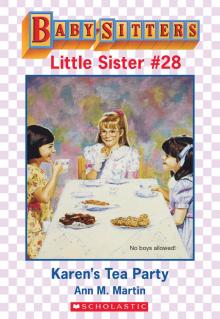 Karen's Tea Party
Karen's Tea Party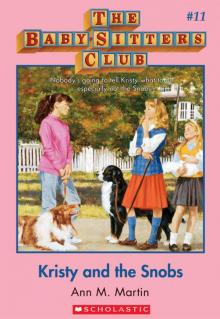 Kristy and the Snobs
Kristy and the Snobs Best Kept Secret
Best Kept Secret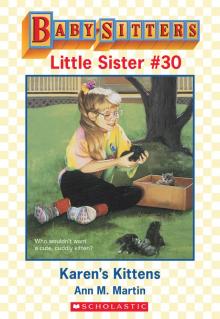 Karen's Kittens
Karen's Kittens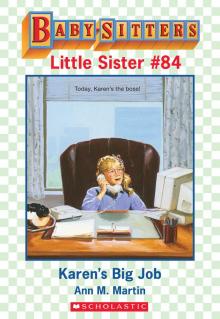 Karen's Big Job
Karen's Big Job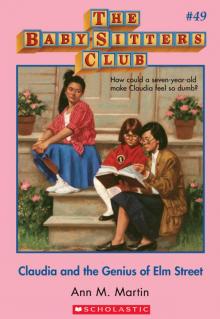 Claudia and the Genius of Elm Street
Claudia and the Genius of Elm Street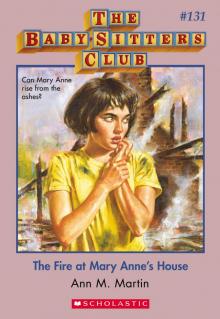 The Fire at Mary Anne's House
The Fire at Mary Anne's House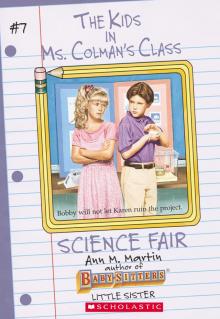 Science Fair
Science Fair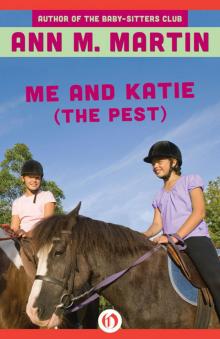 Me and Katie (The Pest)
Me and Katie (The Pest)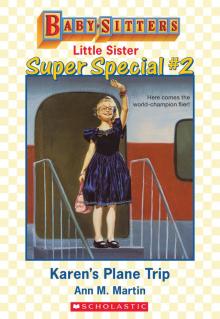 Karen's Plane Trip
Karen's Plane Trip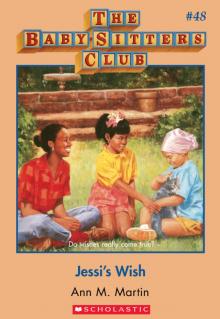 Jessi's Wish
Jessi's Wish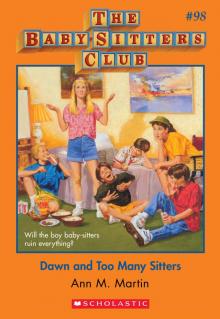 Dawn and Too Many Sitters
Dawn and Too Many Sitters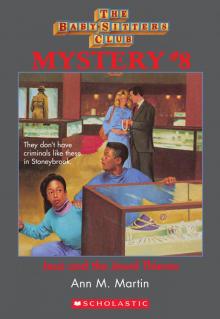 Jessi and the Jewel Thieves
Jessi and the Jewel Thieves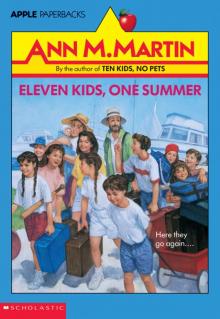 Eleven Kids, One Summer
Eleven Kids, One Summer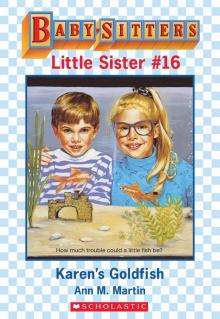 Karen's Goldfish
Karen's Goldfish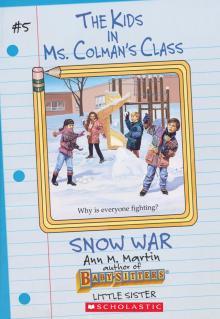 Snow War
Snow War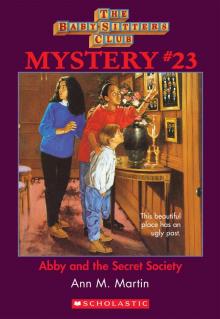 Abby and the Secret Society
Abby and the Secret Society Keeping Secrets
Keeping Secrets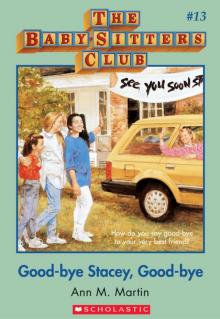 Good-Bye Stacey, Good-Bye
Good-Bye Stacey, Good-Bye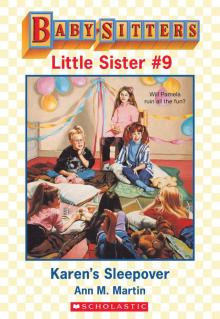 Karen's Sleepover
Karen's Sleepover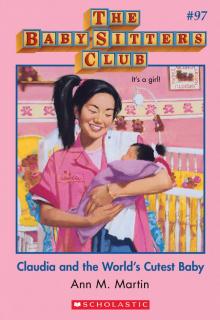 Claudia and the World's Cutest Baby
Claudia and the World's Cutest Baby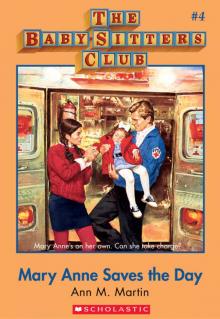 Mary Anne Saves the Day
Mary Anne Saves the Day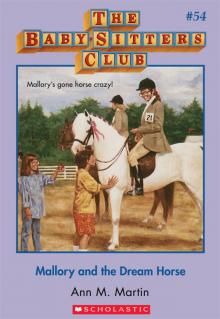 Mallory and the Dream Horse
Mallory and the Dream Horse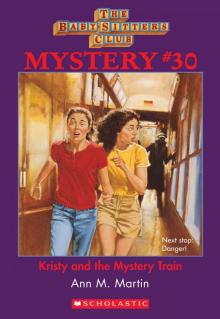 Kristy and the Mystery Train
Kristy and the Mystery Train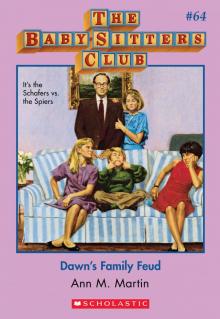 Dawn's Family Feud
Dawn's Family Feud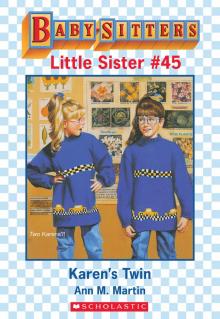 Karen's Twin
Karen's Twin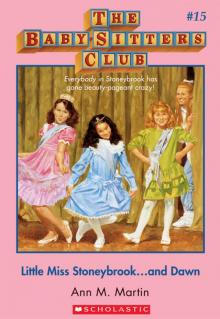 Little Miss Stoneybrook... And Dawn
Little Miss Stoneybrook... And Dawn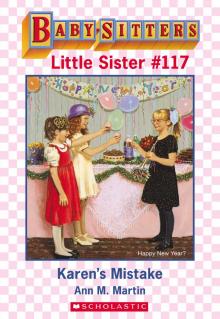 Karen's Mistake
Karen's Mistake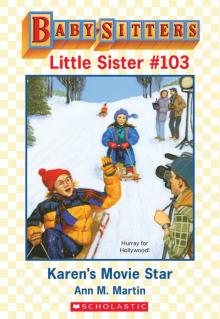 Karen's Movie Star
Karen's Movie Star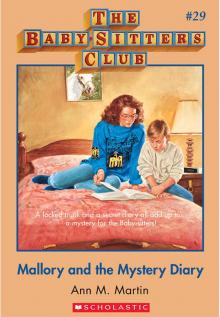 Mallory and the Mystery Diary
Mallory and the Mystery Diary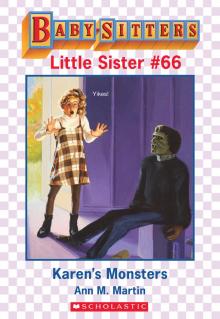 Karen's Monsters
Karen's Monsters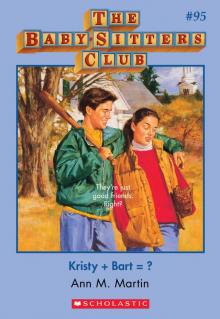 Kristy + Bart = ?
Kristy + Bart = ?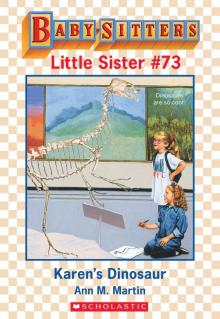 Karen's Dinosaur
Karen's Dinosaur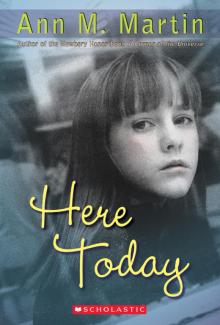 Here Today
Here Today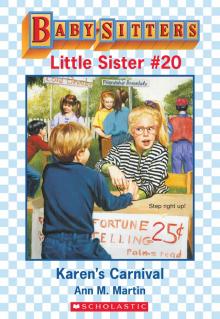 Karen's Carnival
Karen's Carnival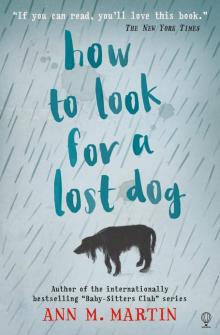 How to Look for a Lost Dog
How to Look for a Lost Dog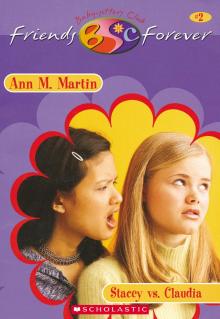 Stacey vs. Claudia
Stacey vs. Claudia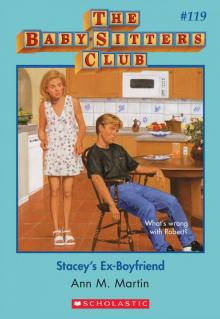 Stacey's Ex-Boyfriend
Stacey's Ex-Boyfriend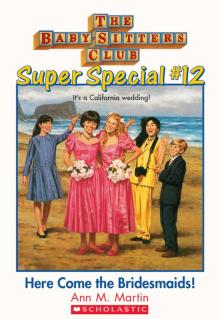 Here Come the Bridesmaids!
Here Come the Bridesmaids! Graduation Day
Graduation Day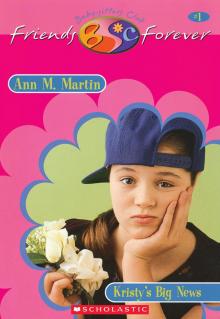 Kristy's Big News
Kristy's Big News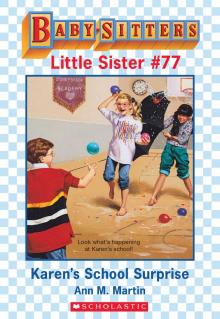 Karen's School Surprise
Karen's School Surprise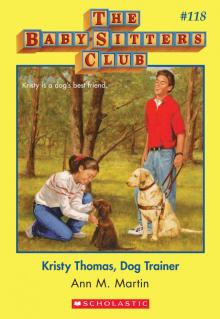 Kristy Thomas, Dog Trainer
Kristy Thomas, Dog Trainer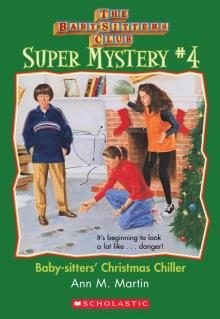 Baby-Sitters' Christmas Chiller
Baby-Sitters' Christmas Chiller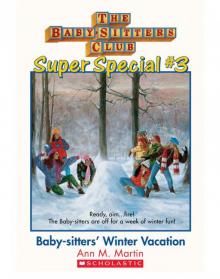 Baby-Sitters' Winter Vacation
Baby-Sitters' Winter Vacation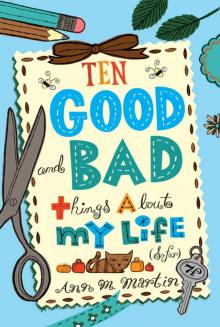 Ten Good and Bad Things About My Life
Ten Good and Bad Things About My Life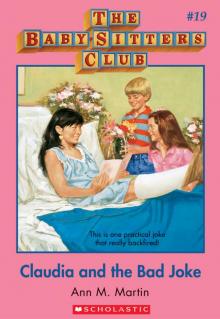 Claudia and the Bad Joke
Claudia and the Bad Joke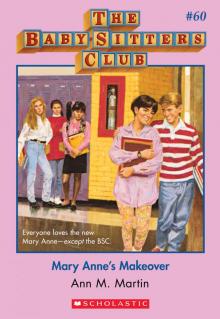 Mary Anne's Makeover
Mary Anne's Makeover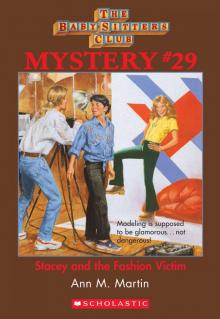 Stacey and the Fashion Victim
Stacey and the Fashion Victim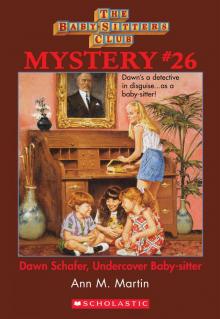 Dawn Schafer, Undercover Baby-Sitter
Dawn Schafer, Undercover Baby-Sitter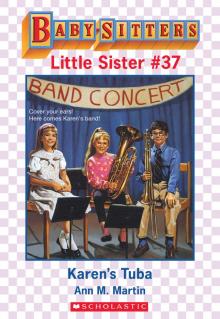 Karen's Tuba
Karen's Tuba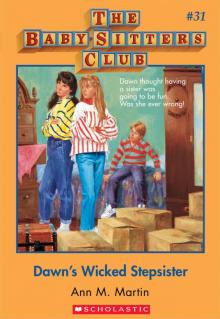 Dawn's Wicked Stepsister
Dawn's Wicked Stepsister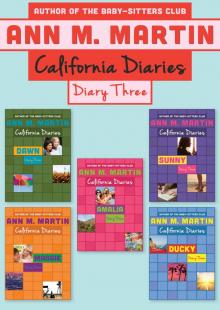 Diary Three: Dawn, Sunny, Maggie, Amalia, and Ducky
Diary Three: Dawn, Sunny, Maggie, Amalia, and Ducky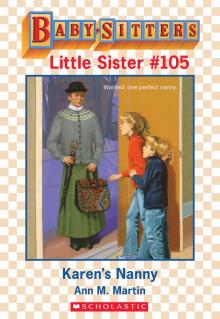 Karen's Nanny
Karen's Nanny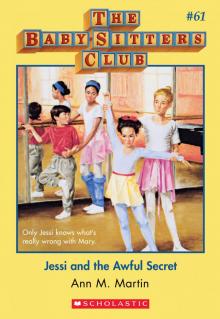 Jessi and the Awful Secret
Jessi and the Awful Secret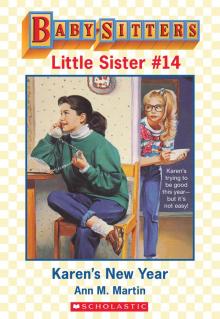 Karen's New Year
Karen's New Year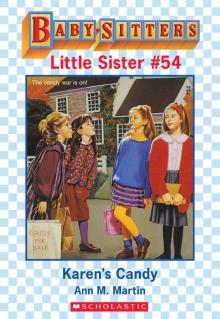 Karen's Candy
Karen's Candy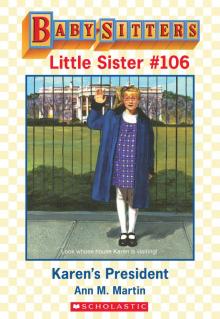 Karen's President
Karen's President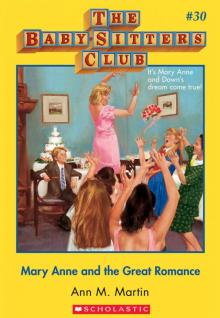 Mary Anne and the Great Romance
Mary Anne and the Great Romance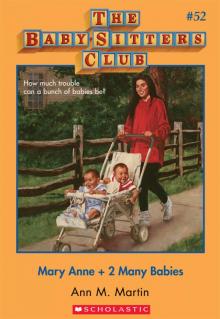 Mary Anne + 2 Many Babies
Mary Anne + 2 Many Babies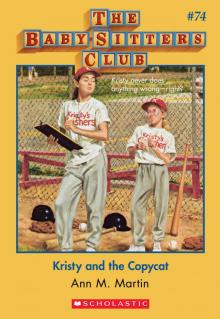 Kristy and the Copycat
Kristy and the Copycat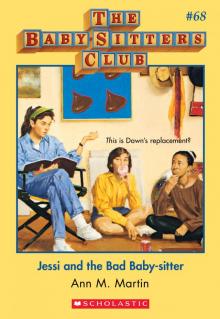 Jessi and the Bad Baby-Sitter
Jessi and the Bad Baby-Sitter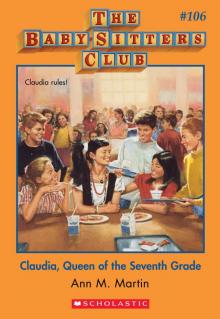 Claudia, Queen of the Seventh Grade
Claudia, Queen of the Seventh Grade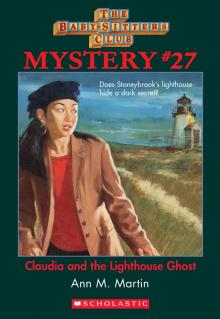 Claudia and the Lighthouse Ghost
Claudia and the Lighthouse Ghost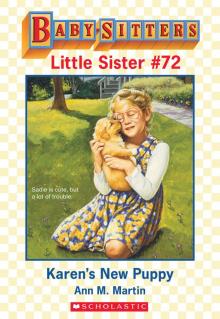 Karen's New Puppy
Karen's New Puppy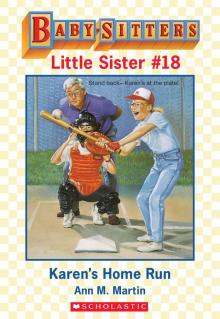 Karen's Home Run
Karen's Home Run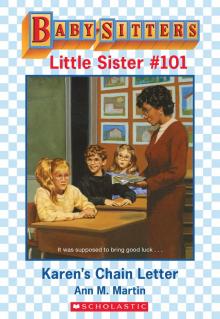 Karen's Chain Letter
Karen's Chain Letter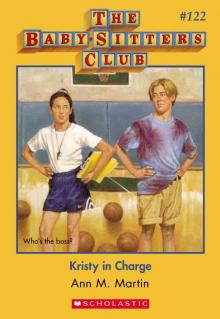 Kristy in Charge
Kristy in Charge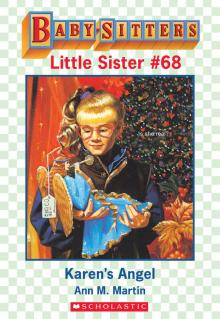 Karen's Angel
Karen's Angel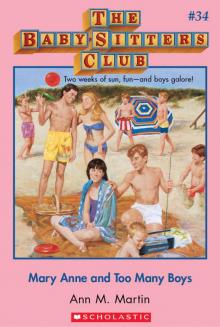 Mary Anne and Too Many Boys
Mary Anne and Too Many Boys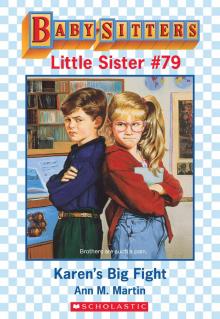 Karen's Big Fight
Karen's Big Fight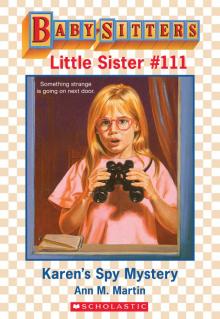 Karen's Spy Mystery
Karen's Spy Mystery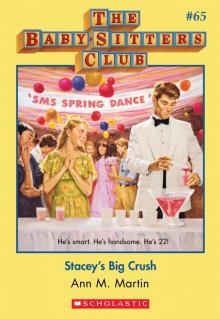 Stacey's Big Crush
Stacey's Big Crush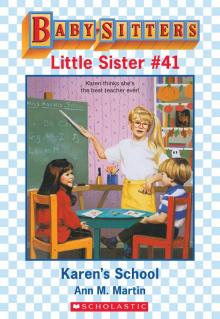 Karen's School
Karen's School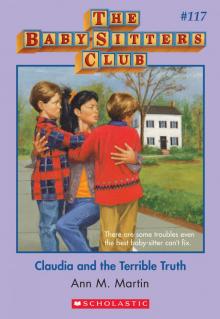 Claudia and the Terrible Truth
Claudia and the Terrible Truth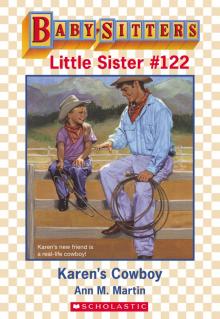 Karen's Cowboy
Karen's Cowboy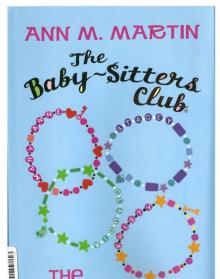 The Summer Before
The Summer Before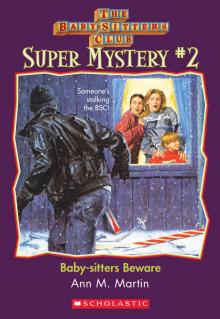 Beware, Dawn!
Beware, Dawn!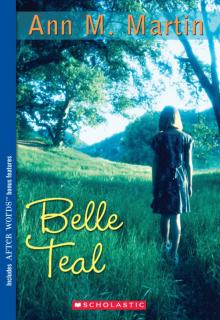 Belle Teale
Belle Teale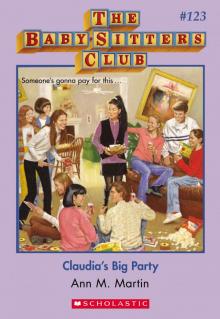 Claudia's Big Party
Claudia's Big Party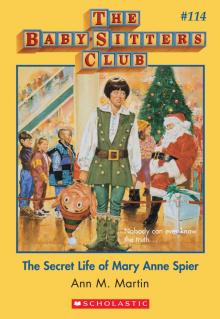 The Secret Life of Mary Anne Spier
The Secret Life of Mary Anne Spier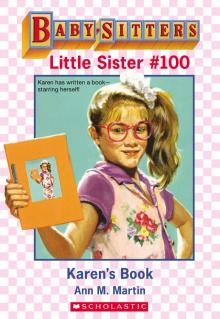 Karen's Book
Karen's Book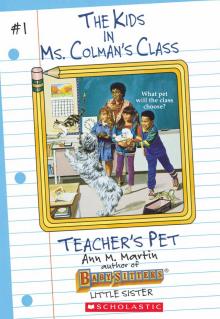 Teacher's Pet
Teacher's Pet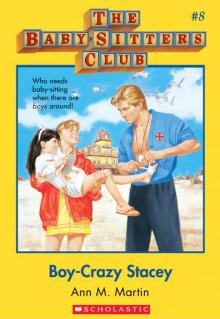 Boy-Crazy Stacey
Boy-Crazy Stacey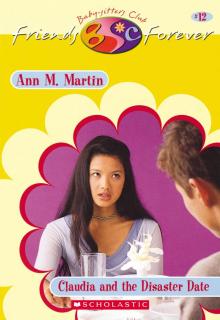 Claudia and the Disaster Date
Claudia and the Disaster Date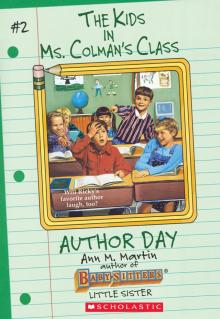 Author Day
Author Day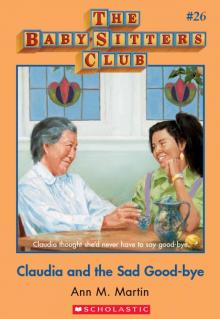 Claudia and the Sad Good-Bye
Claudia and the Sad Good-Bye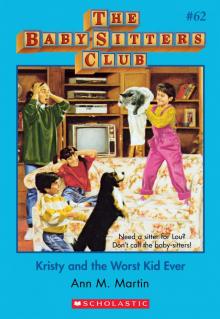 Kristy and the Worst Kid Ever
Kristy and the Worst Kid Ever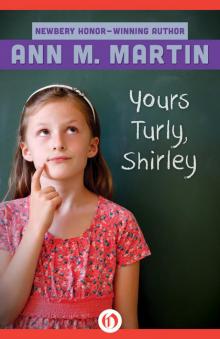 Yours Turly, Shirley
Yours Turly, Shirley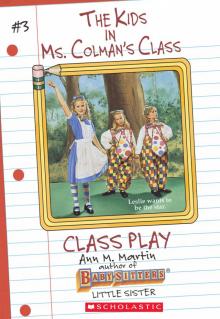 Class Play
Class Play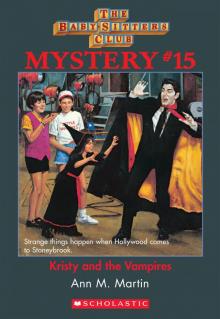 Kristy and the Vampires
Kristy and the Vampires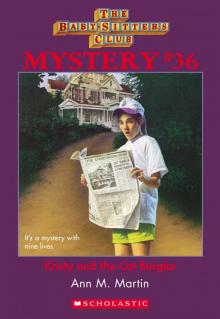 Kristy and the Cat Burglar
Kristy and the Cat Burglar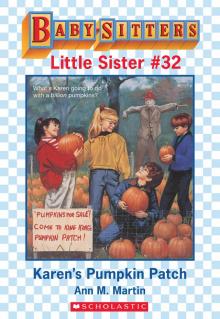 Karen's Pumpkin Patch
Karen's Pumpkin Patch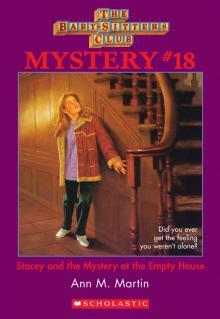 Stacey and the Mystery at the Empty House
Stacey and the Mystery at the Empty House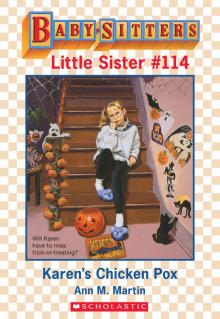 Karen's Chicken Pox
Karen's Chicken Pox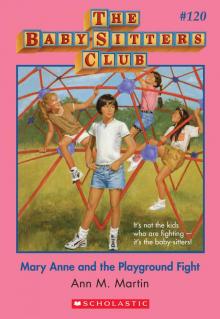 Mary Anne and the Playground Fight
Mary Anne and the Playground Fight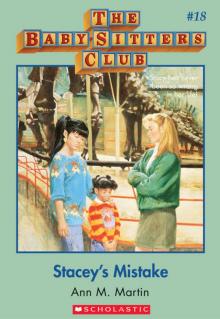 Stacey's Mistake
Stacey's Mistake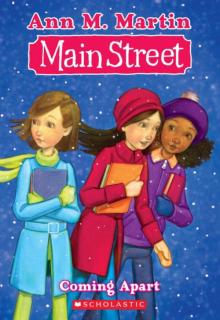 Coming Apart
Coming Apart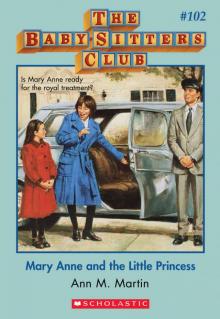 Mary Anne and the Little Princess
Mary Anne and the Little Princess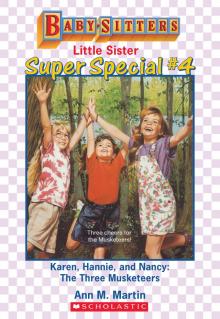 Karen, Hannie and Nancy: The Three Musketeers
Karen, Hannie and Nancy: The Three Musketeers 'Tis the Season
'Tis the Season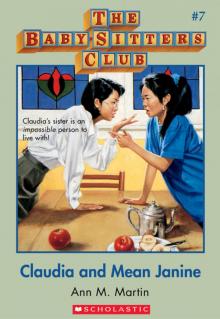 Claudia and Mean Janine
Claudia and Mean Janine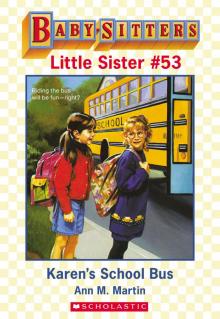 Karen's School Bus
Karen's School Bus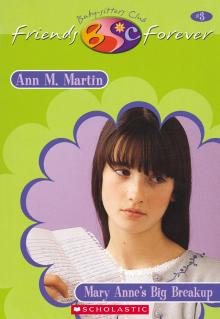 Mary Anne's Big Breakup
Mary Anne's Big Breakup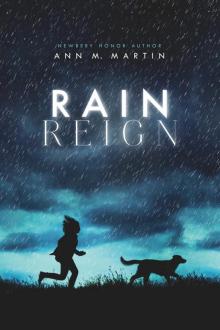 Rain Reign
Rain Reign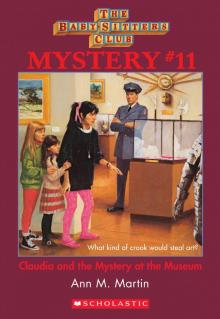 Claudia and the Mystery at the Museum
Claudia and the Mystery at the Museum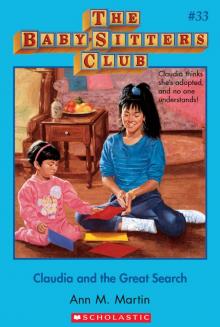 Claudia and the Great Search
Claudia and the Great Search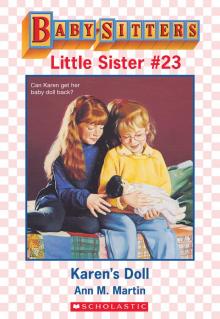 Karen's Doll
Karen's Doll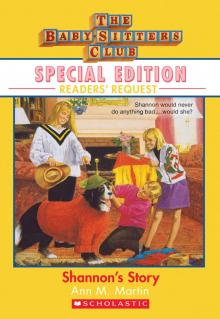 Shannon's Story
Shannon's Story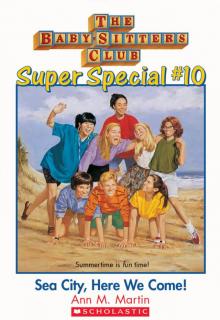 Sea City, Here We Come!
Sea City, Here We Come!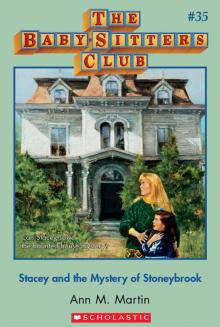 Stacey and the Mystery of Stoneybrook
Stacey and the Mystery of Stoneybrook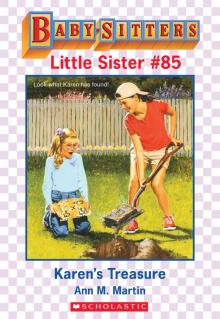 Karen's Treasure
Karen's Treasure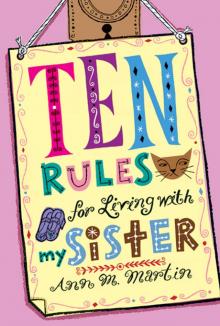 Ten Rules for Living With My Sister
Ten Rules for Living With My Sister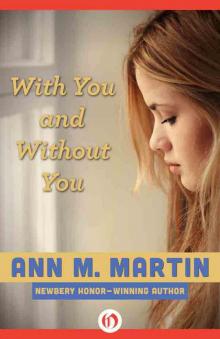 With You and Without You
With You and Without You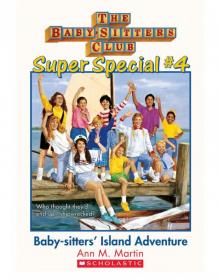 Baby-Sitters' Island Adventure
Baby-Sitters' Island Adventure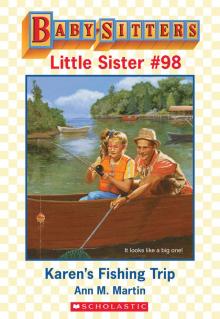 Karen's Fishing Trip
Karen's Fishing Trip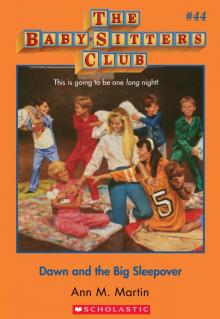 Dawn and the Big Sleepover
Dawn and the Big Sleepover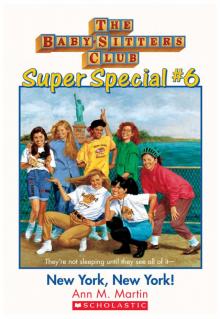 New York, New York!
New York, New York!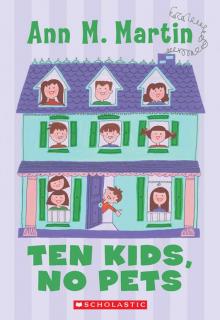 Ten Kids, No Pets
Ten Kids, No Pets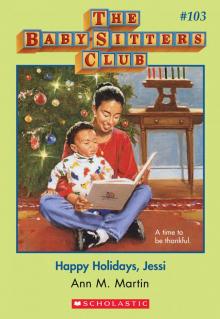 Happy Holidays, Jessi
Happy Holidays, Jessi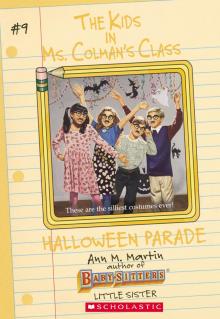 Halloween Parade
Halloween Parade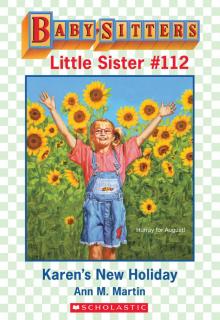 Karen's New Holiday
Karen's New Holiday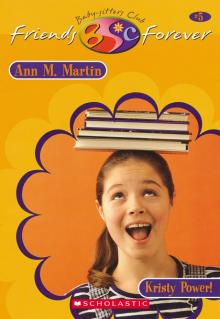 Kristy Power!
Kristy Power!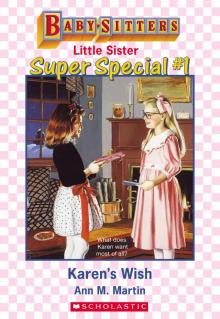 Karen's Wish
Karen's Wish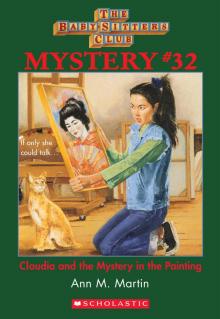 Claudia and the Mystery in the Painting
Claudia and the Mystery in the Painting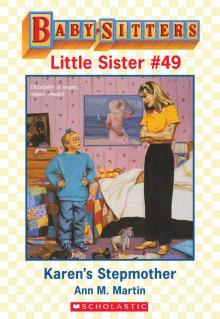 Karen's Stepmother
Karen's Stepmother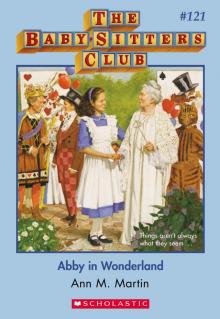 Abby in Wonderland
Abby in Wonderland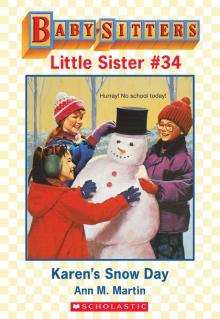 Karen's Snow Day
Karen's Snow Day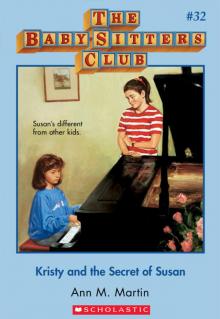 Kristy and the Secret of Susan
Kristy and the Secret of Susan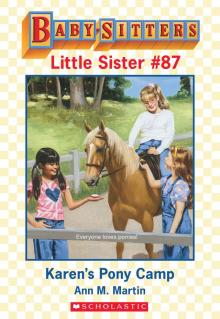 Karen's Pony Camp
Karen's Pony Camp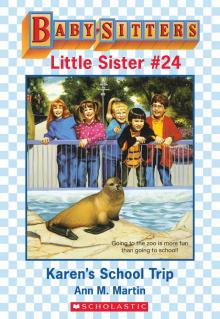 Karen's School Trip
Karen's School Trip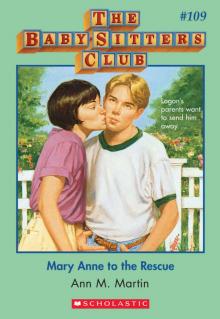 Mary Anne to the Rescue
Mary Anne to the Rescue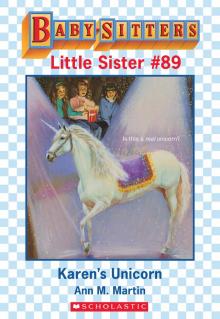 Karen's Unicorn
Karen's Unicorn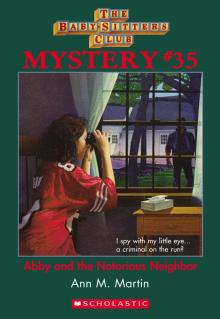 Abby and the Notorious Neighbor
Abby and the Notorious Neighbor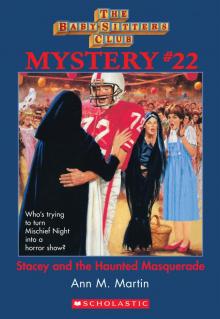 Stacey and the Haunted Masquerade
Stacey and the Haunted Masquerade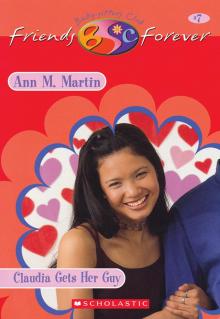 Claudia Gets Her Guy
Claudia Gets Her Guy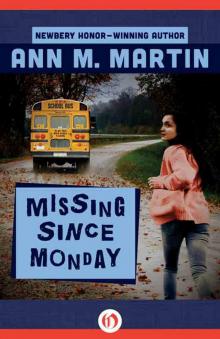 Missing Since Monday
Missing Since Monday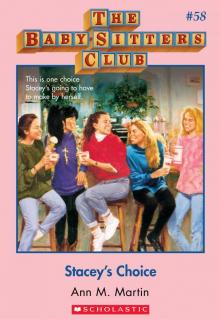 Stacey's Choice
Stacey's Choice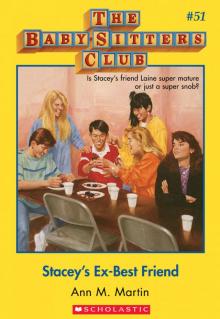 Stacey's Ex-Best Friend
Stacey's Ex-Best Friend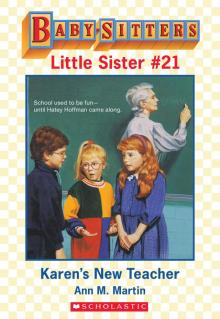 Karen's New Teacher
Karen's New Teacher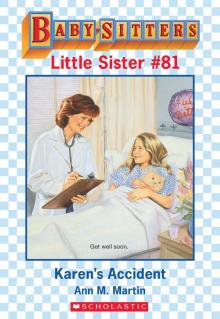 Karen's Accident
Karen's Accident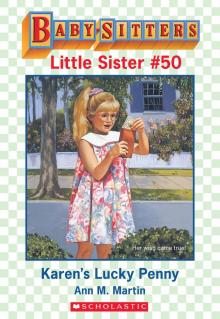 Karen's Lucky Penny
Karen's Lucky Penny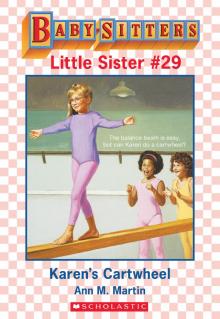 Karen's Cartwheel
Karen's Cartwheel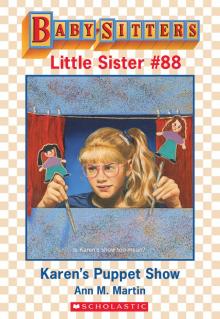 Karen's Puppet Show
Karen's Puppet Show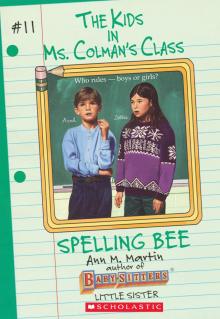 Spelling Bee
Spelling Bee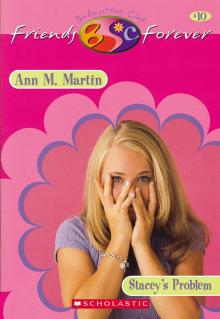 Stacey's Problem
Stacey's Problem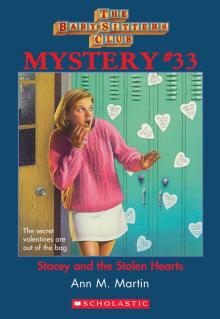 Stacey and the Stolen Hearts
Stacey and the Stolen Hearts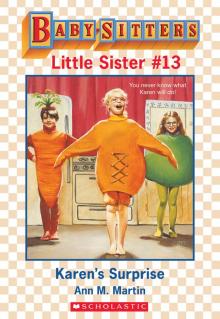 Karen's Surprise
Karen's Surprise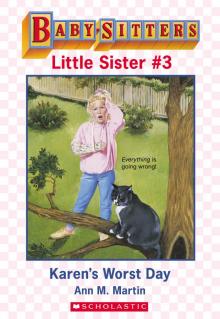 Karen's Worst Day
Karen's Worst Day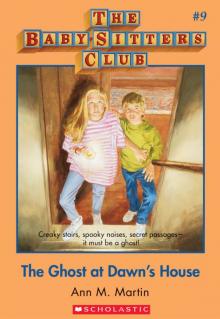 The Ghost at Dawn's House
The Ghost at Dawn's House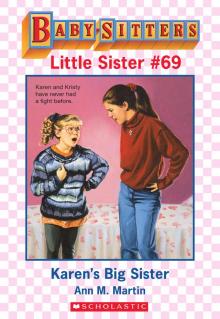 Karen's Big Sister
Karen's Big Sister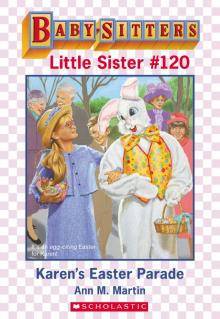 Karen's Easter Parade
Karen's Easter Parade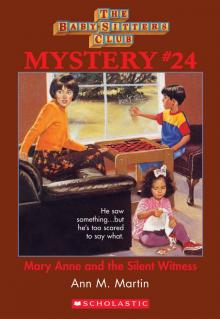 Mary Anne and the Silent Witness
Mary Anne and the Silent Witness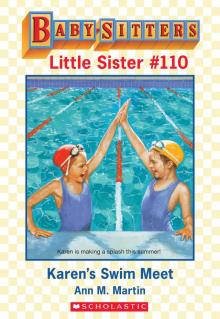 Karen's Swim Meet
Karen's Swim Meet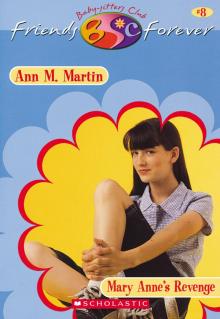 Mary Anne's Revenge
Mary Anne's Revenge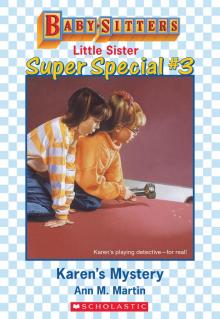 Karen's Mystery
Karen's Mystery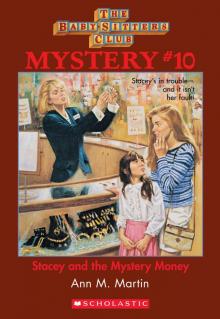 Stacey and the Mystery Money
Stacey and the Mystery Money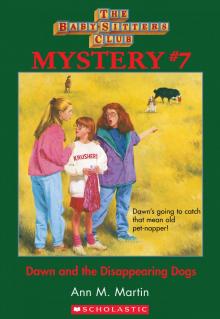 Dawn and the Disappearing Dogs
Dawn and the Disappearing Dogs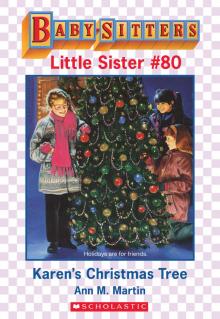 Karen's Christmas Tree
Karen's Christmas Tree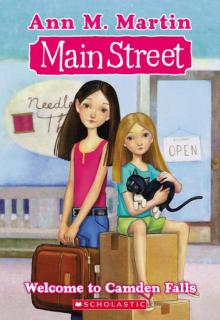 Welcome to Camden Falls
Welcome to Camden Falls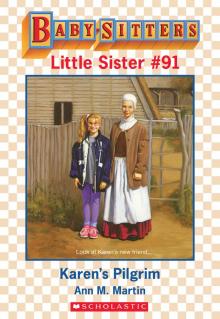 Karen's Pilgrim
Karen's Pilgrim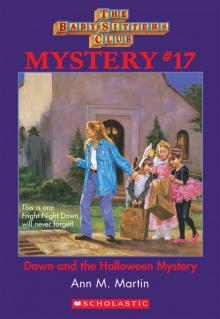 Dawn and the Halloween Mystery
Dawn and the Halloween Mystery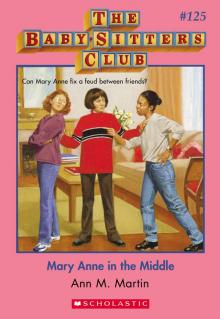 Mary Anne in the Middle
Mary Anne in the Middle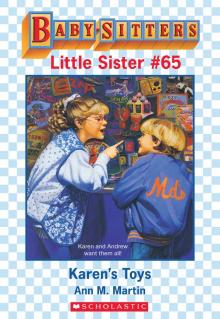 Karen's Toys
Karen's Toys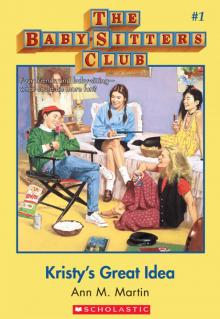 Kristy's Great Idea
Kristy's Great Idea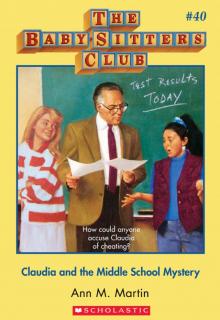 Claudia and the Middle School Mystery
Claudia and the Middle School Mystery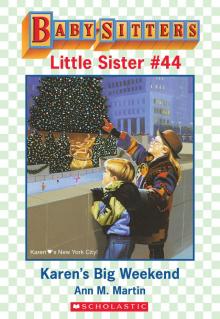 Karen's Big Weekend
Karen's Big Weekend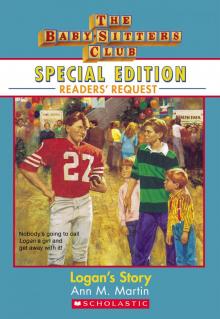 Logan's Story
Logan's Story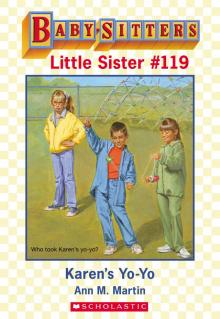 Karen's Yo-Yo
Karen's Yo-Yo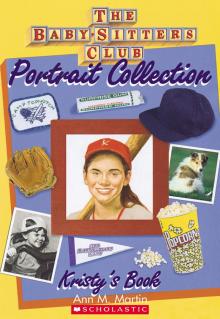 Kristy's Book
Kristy's Book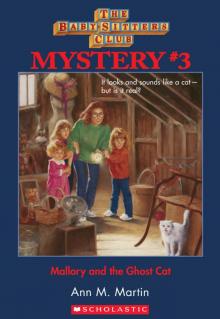 Mallory and the Ghost Cat
Mallory and the Ghost Cat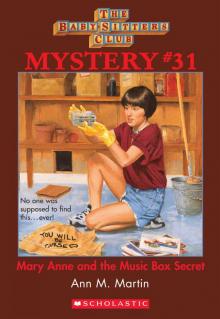 Mary Anne and the Music
Mary Anne and the Music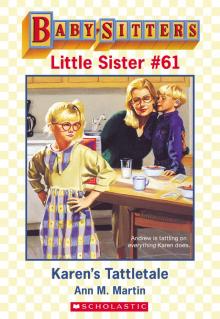 Karen's Tattletale
Karen's Tattletale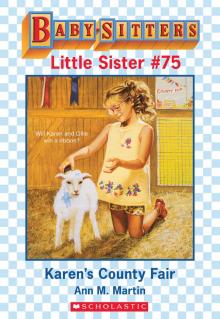 Karen's County Fair
Karen's County Fair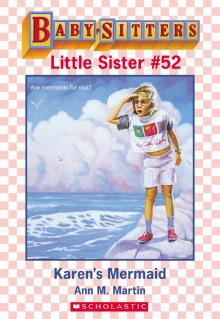 Karen's Mermaid
Karen's Mermaid Snowbound
Snowbound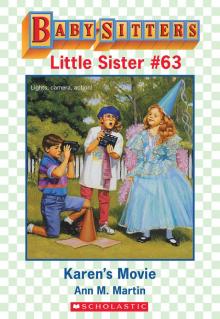 Karen's Movie
Karen's Movie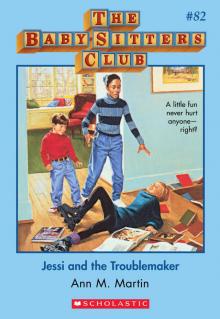 Jessi and the Troublemaker
Jessi and the Troublemaker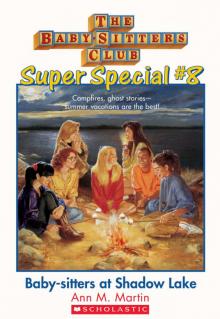 Baby-Sitters at Shadow Lake
Baby-Sitters at Shadow Lake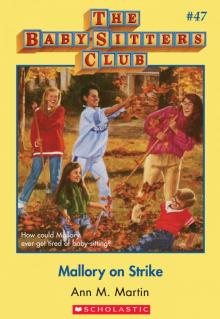 Mallory on Strike
Mallory on Strike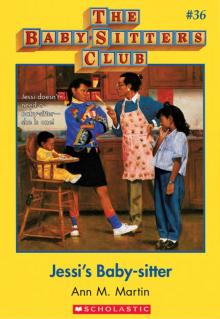 Jessi's Baby-Sitter
Jessi's Baby-Sitter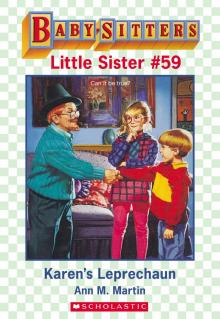 Karen's Leprechaun
Karen's Leprechaun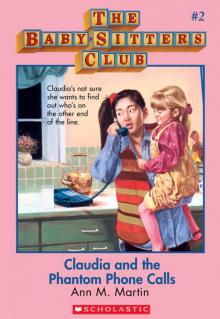 Claudia and the Phantom Phone Calls
Claudia and the Phantom Phone Calls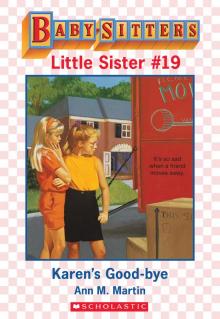 Karen's Good-Bye
Karen's Good-Bye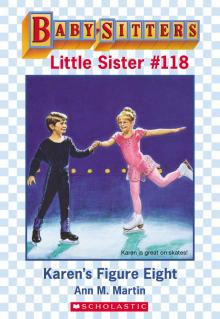 Karen's Figure Eight
Karen's Figure Eight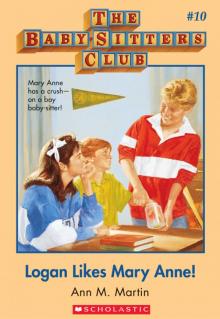 Logan Likes Mary Anne!
Logan Likes Mary Anne!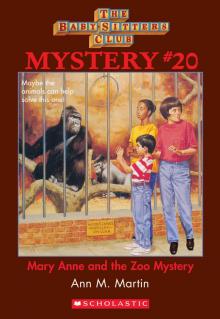 Mary Anne and the Zoo Mystery
Mary Anne and the Zoo Mystery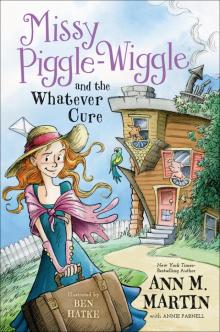 Missy Piggle-Wiggle and the Whatever Cure
Missy Piggle-Wiggle and the Whatever Cure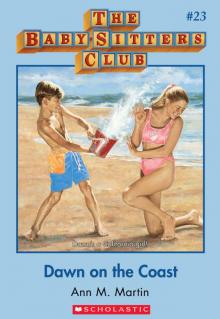 Dawn on the Coast
Dawn on the Coast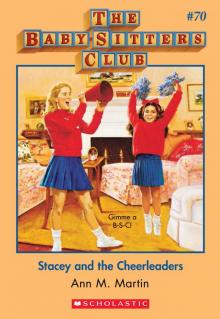 Stacey and the Cheerleaders
Stacey and the Cheerleaders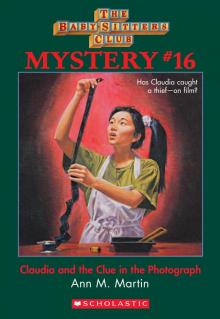 Claudia and the Clue in the Photograph
Claudia and the Clue in the Photograph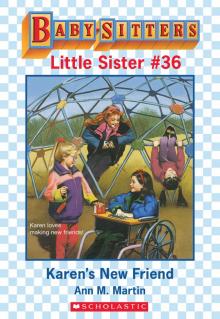 Karen's New Friend
Karen's New Friend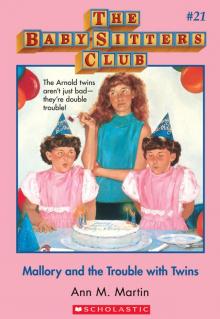 Mallory and the Trouble With Twins
Mallory and the Trouble With Twins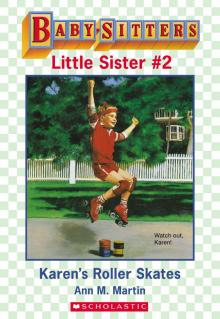 Karen's Roller Skates
Karen's Roller Skates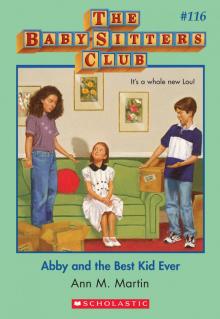 Abby and the Best Kid Ever
Abby and the Best Kid Ever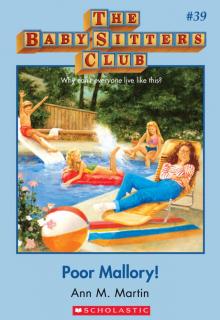 Poor Mallory!
Poor Mallory!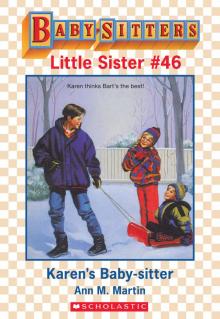 Karen's Witch
Karen's Witch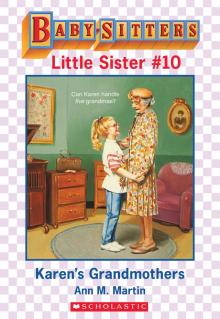 Karen's Grandmothers
Karen's Grandmothers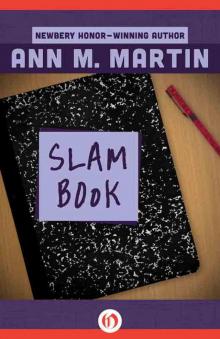 Slam Book
Slam Book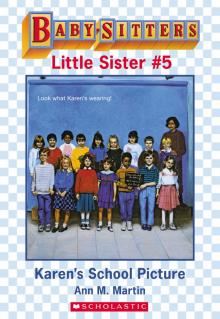 Karen's School Picture
Karen's School Picture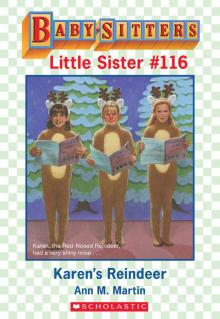 Karen's Reindeer
Karen's Reindeer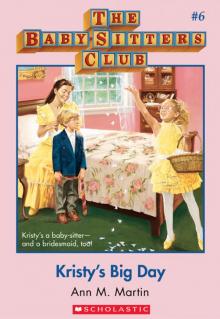 Kristy's Big Day
Kristy's Big Day The Long Way Home
The Long Way Home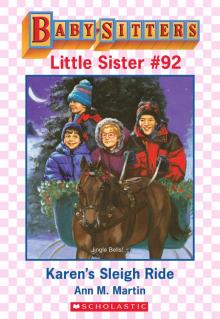 Karen's Sleigh Ride
Karen's Sleigh Ride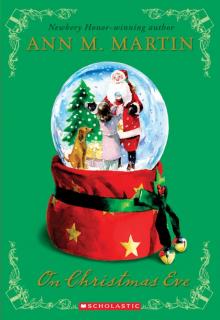 On Christmas Eve
On Christmas Eve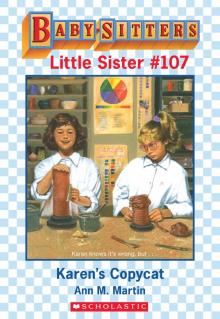 Karen's Copycat
Karen's Copycat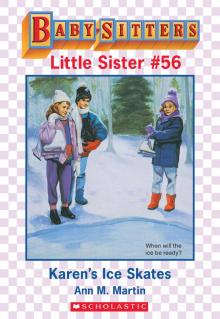 Karen's Ice Skates
Karen's Ice Skates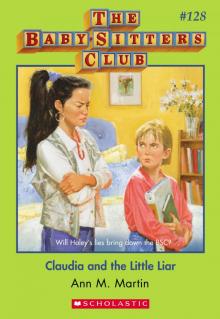 Claudia and the Little Liar
Claudia and the Little Liar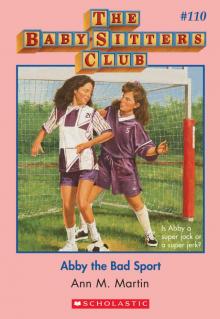 Abby the Bad Sport
Abby the Bad Sport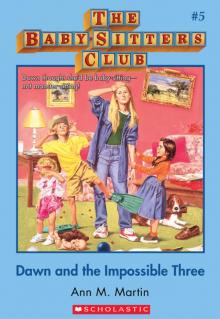 The Baby-Sitters Club #5: Dawn and the Impossible Three
The Baby-Sitters Club #5: Dawn and the Impossible Three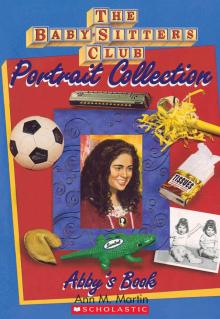 Abby's Book
Abby's Book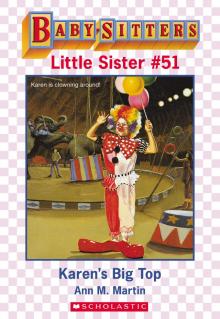 Karen's Big Top
Karen's Big Top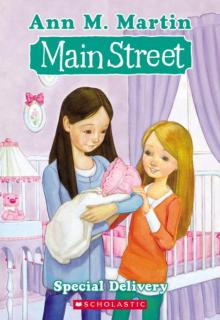 Main Street #8: Special Delivery
Main Street #8: Special Delivery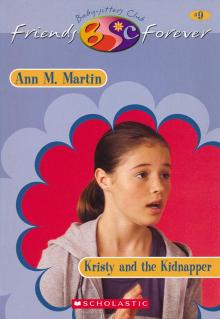 Kristy and the Kidnapper
Kristy and the Kidnapper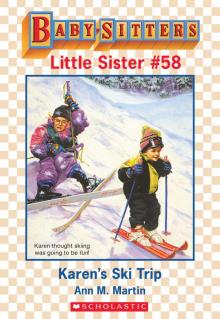 Karen's Ski Trip
Karen's Ski Trip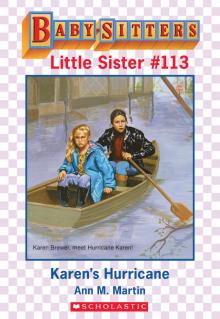 Karen's Hurricane
Karen's Hurricane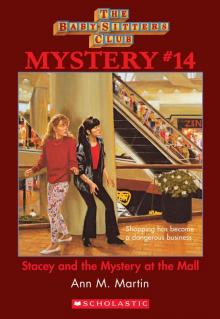 Stacey and the Mystery at the Mall
Stacey and the Mystery at the Mall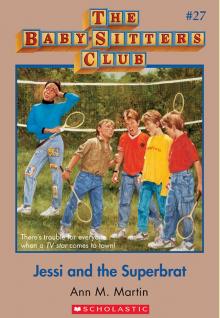 Jessi and the Superbrat
Jessi and the Superbrat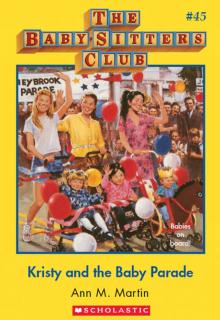 Kristy and the Baby Parade
Kristy and the Baby Parade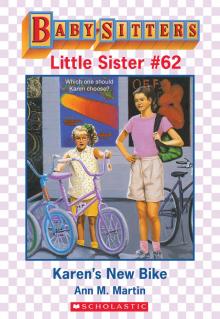 Karen's New Bike
Karen's New Bike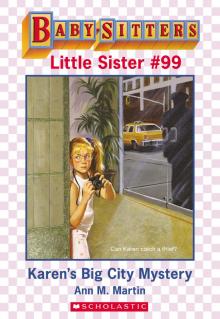 Karen's Big City Mystery
Karen's Big City Mystery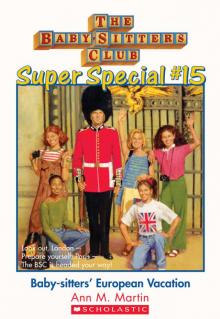 Baby-Sitters' European Vacation
Baby-Sitters' European Vacation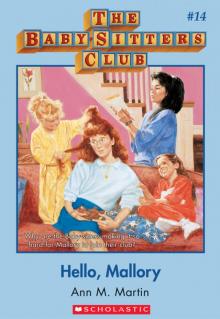 Hello, Mallory
Hello, Mallory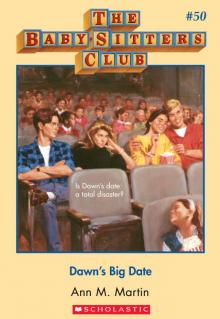 Dawn's Big Date
Dawn's Big Date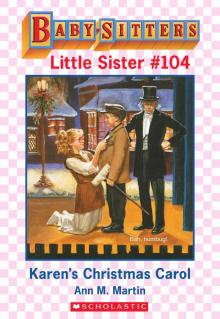 Karen's Christmas Carol
Karen's Christmas Carol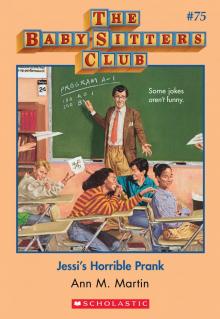 Jessi's Horrible Prank
Jessi's Horrible Prank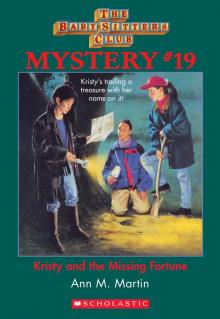 Kristy and the Missing Fortune
Kristy and the Missing Fortune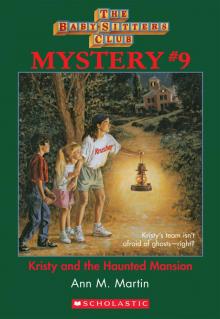 Kristy and the Haunted Mansion
Kristy and the Haunted Mansion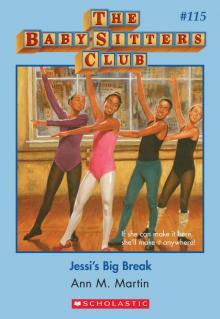 Jessi's Big Break
Jessi's Big Break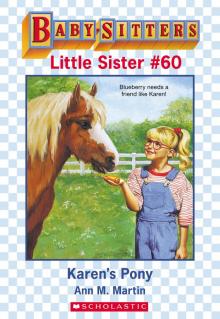 Karen's Pony
Karen's Pony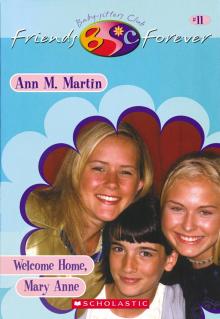 Welcome Home, Mary Anne
Welcome Home, Mary Anne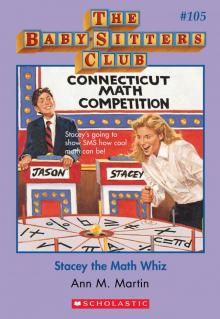 Stacey the Math Whiz
Stacey the Math Whiz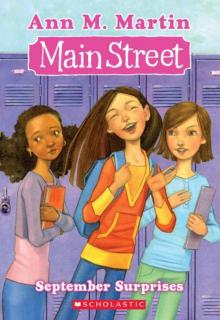 September Surprises
September Surprises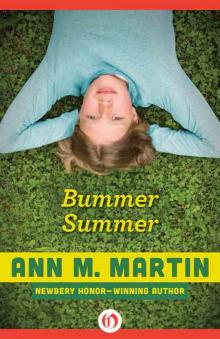 Bummer Summer
Bummer Summer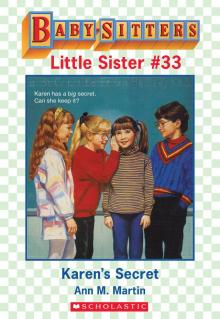 Karen's Secret
Karen's Secret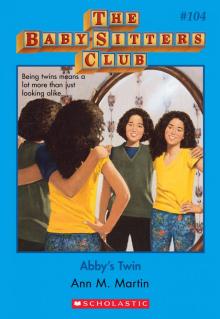 Abby's Twin
Abby's Twin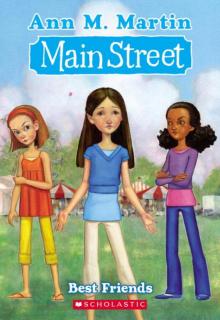 Main Street #4: Best Friends
Main Street #4: Best Friends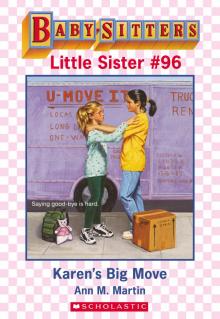 Karen's Big Move
Karen's Big Move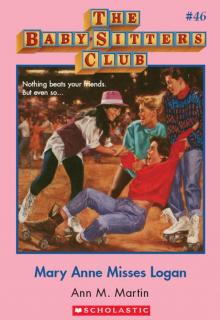 Mary Anne Misses Logan
Mary Anne Misses Logan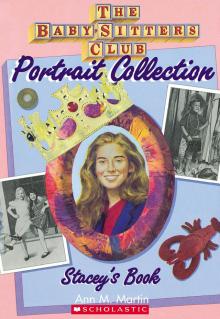 Stacey's Book
Stacey's Book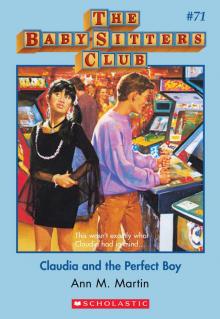 Claudia and the Perfect Boy
Claudia and the Perfect Boy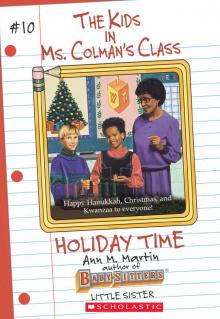 Holiday Time
Holiday Time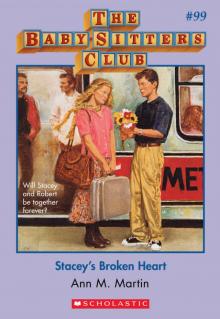 Stacey's Broken Heart
Stacey's Broken Heart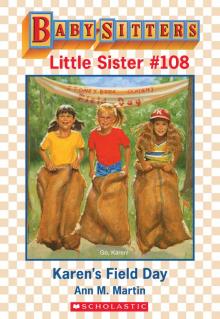 Karen's Field Day
Karen's Field Day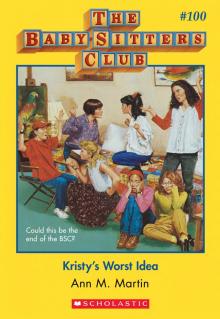 Kristy's Worst Idea
Kristy's Worst Idea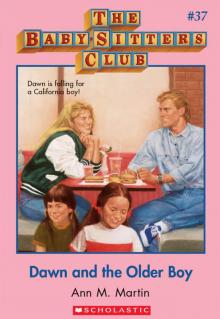 Dawn and the Older Boy
Dawn and the Older Boy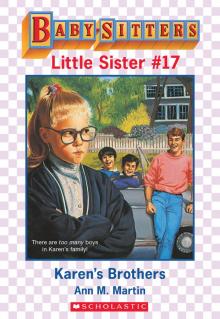 Karen's Brothers
Karen's Brothers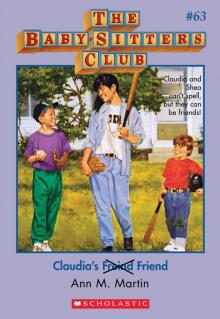 Claudia's Friend
Claudia's Friend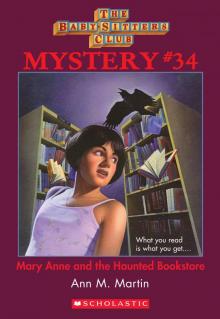 Mary Anne and the Haunted Bookstore
Mary Anne and the Haunted Bookstore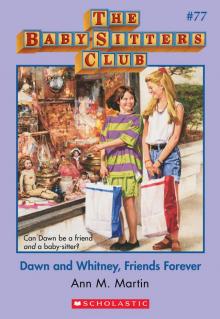 Dawn and Whitney, Friends Forever
Dawn and Whitney, Friends Forever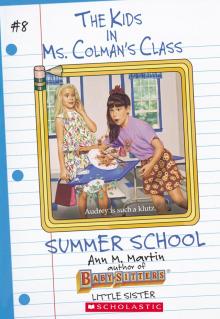 Summer School
Summer School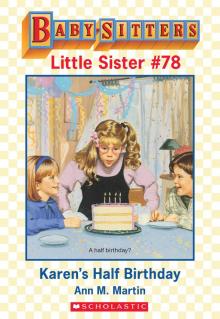 Karen's Birthday
Karen's Birthday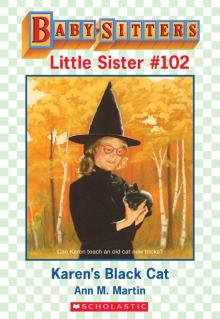 Karen's Black Cat
Karen's Black Cat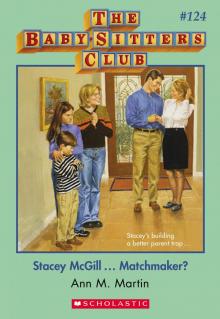 Stacey McGill... Matchmaker?
Stacey McGill... Matchmaker?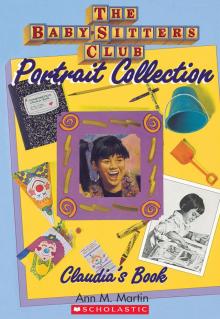 Claudia's Book
Claudia's Book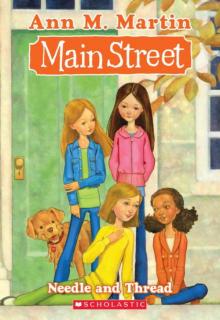 Main Street #2: Needle and Thread
Main Street #2: Needle and Thread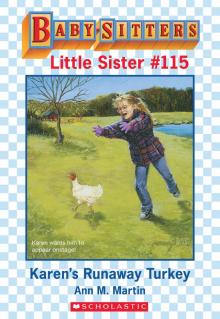 Karen's Runaway Turkey
Karen's Runaway Turkey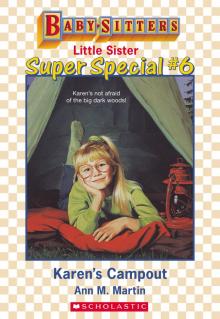 Karen's Campout
Karen's Campout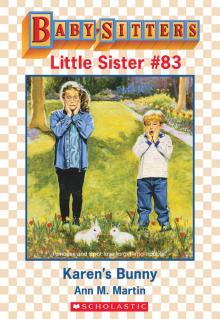 Karen's Bunny
Karen's Bunny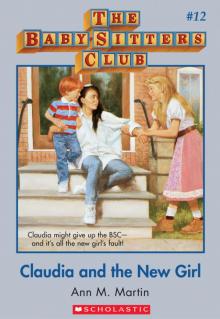 Claudia and the New Girl
Claudia and the New Girl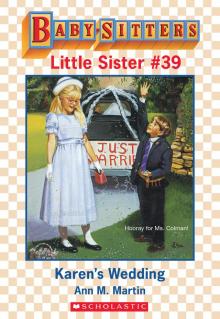 Karen's Wedding
Karen's Wedding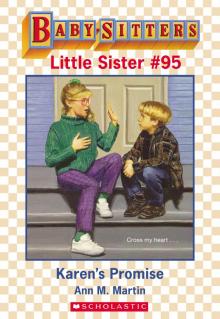 Karen's Promise
Karen's Promise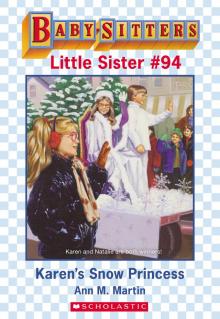 Karen's Snow Princess
Karen's Snow Princess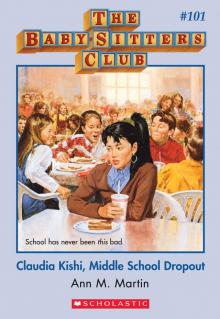 Claudia Kishi, Middle School Dropout
Claudia Kishi, Middle School Dropout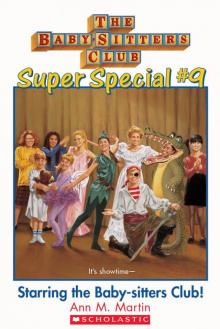 Starring the Baby-Sitters Club!
Starring the Baby-Sitters Club!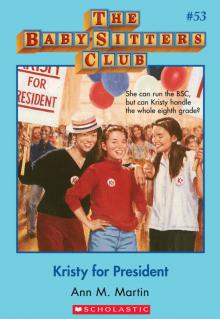 Kristy for President
Kristy for President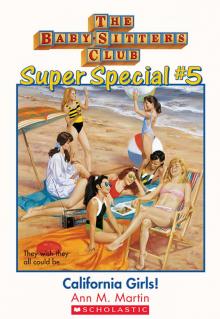 California Girls!
California Girls!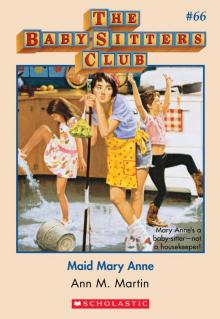 Maid Mary Anne
Maid Mary Anne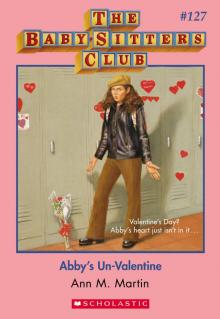 Abby's Un-Valentine
Abby's Un-Valentine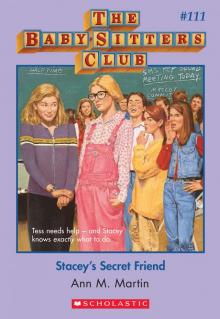 Stacey's Secret Friend
Stacey's Secret Friend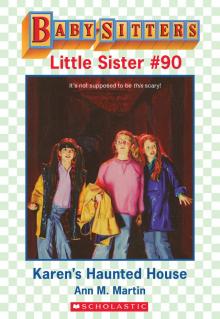 Karen's Haunted House
Karen's Haunted House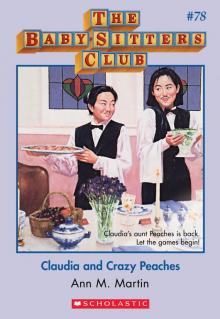 Claudia and Crazy Peaches
Claudia and Crazy Peaches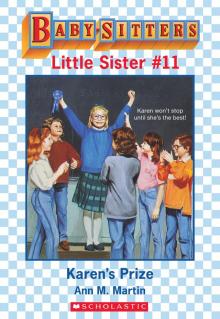 Karen's Prize
Karen's Prize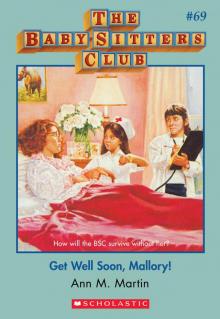 Get Well Soon, Mallory!
Get Well Soon, Mallory!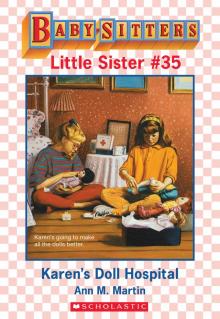 Karen's Doll Hospital
Karen's Doll Hospital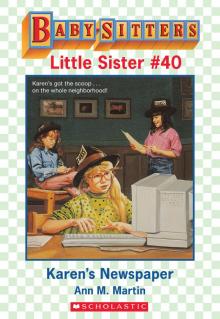 Karen's Newspaper
Karen's Newspaper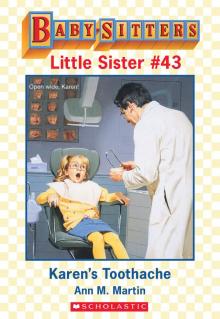 Karen's Toothache
Karen's Toothache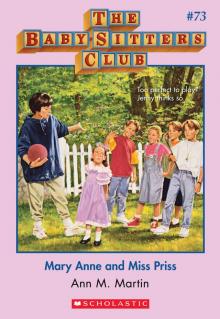 Mary Anne and Miss Priss
Mary Anne and Miss Priss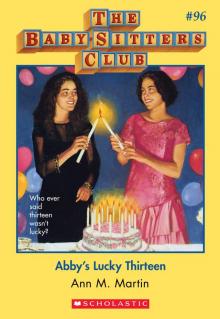 Abby's Lucky Thirteen
Abby's Lucky Thirteen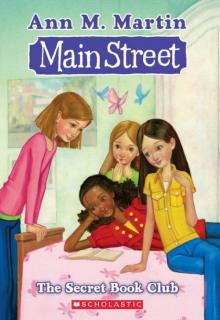 The Secret Book Club
The Secret Book Club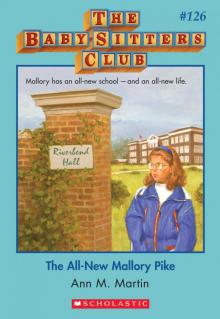 The All-New Mallory Pike
The All-New Mallory Pike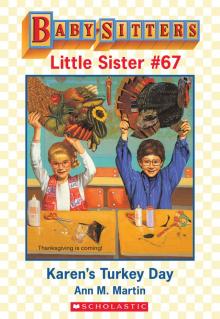 Karen's Turkey Day
Karen's Turkey Day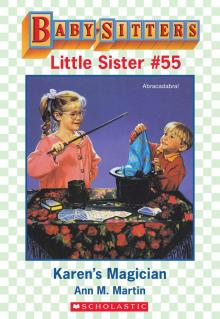 Karen's Magician
Karen's Magician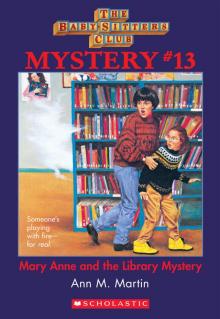 Mary Anne and the Library Mystery
Mary Anne and the Library Mystery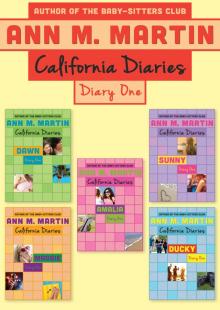 Diary One: Dawn, Sunny, Maggie, Amalia, and Ducky
Diary One: Dawn, Sunny, Maggie, Amalia, and Ducky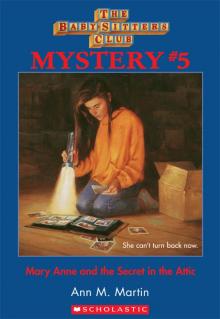 Mary Anne and the Secret in the Attic
Mary Anne and the Secret in the Attic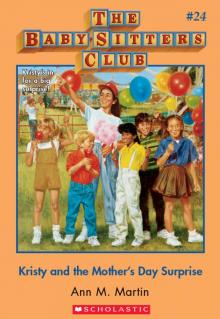 Kristy and the Mother's Day Surprise
Kristy and the Mother's Day Surprise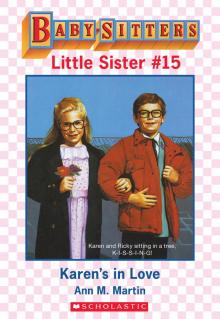 Karen's in Love
Karen's in Love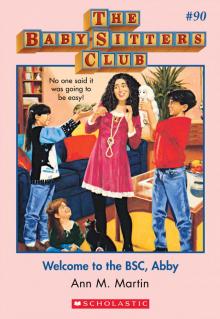 Welcome to the BSC, Abby
Welcome to the BSC, Abby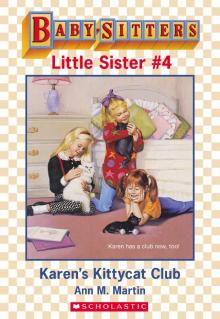 Karen's Kittycat Club
Karen's Kittycat Club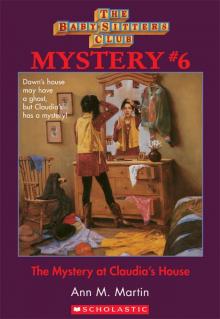 The Mystery at Claudia's House
The Mystery at Claudia's House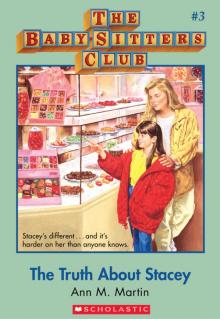 The Truth About Stacey
The Truth About Stacey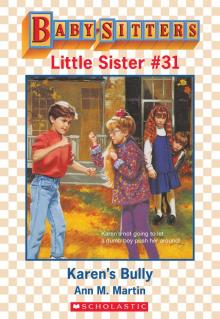 Karen's Bully
Karen's Bully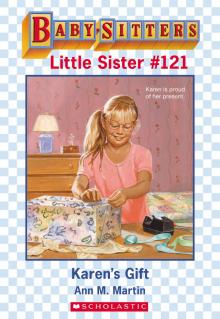 Karen's Gift
Karen's Gift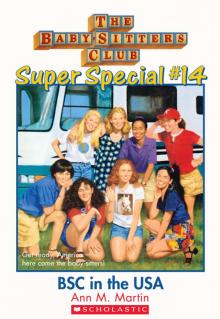 BSC in the USA
BSC in the USA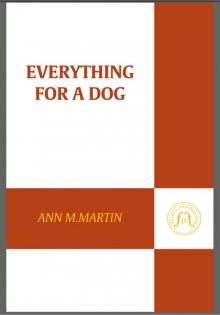 Everything for a Dog
Everything for a Dog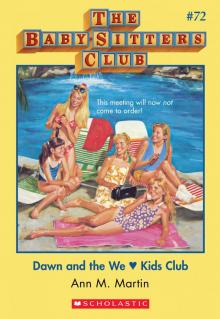 Dawn and the We Love Kids Club
Dawn and the We Love Kids Club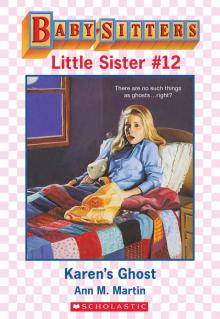 Karen's Ghost
Karen's Ghost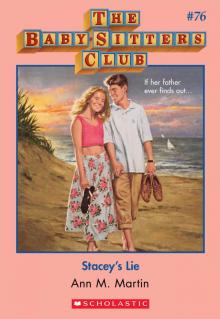 Stacey's Lie
Stacey's Lie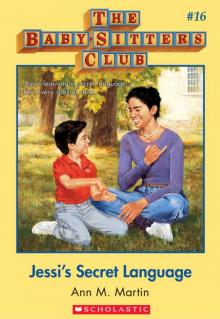 Jessi's Secret Language
Jessi's Secret Language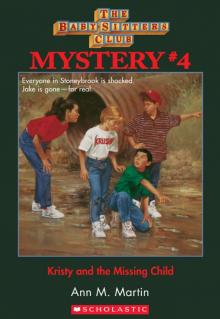 Kristy and the Missing Child
Kristy and the Missing Child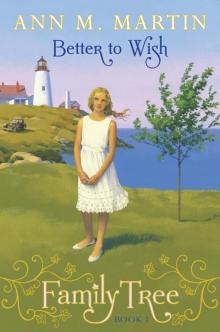 Better to Wish
Better to Wish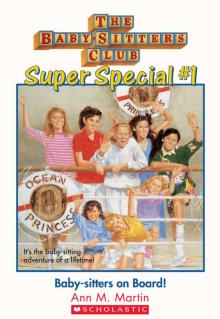 Baby-Sitters on Board!
Baby-Sitters on Board!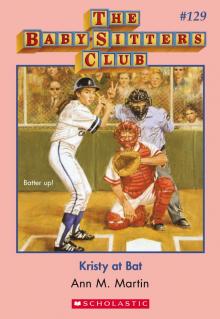 Kristy at Bat
Kristy at Bat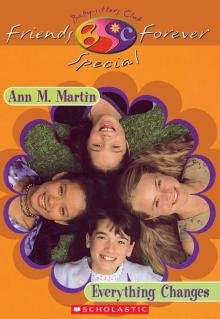 Everything Changes
Everything Changes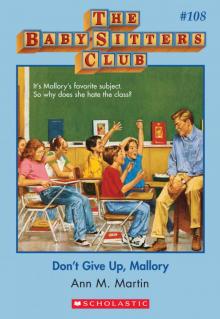 Don't Give Up, Mallory
Don't Give Up, Mallory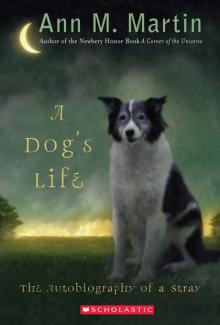 A Dog's Life: The Autobiography of a Stray
A Dog's Life: The Autobiography of a Stray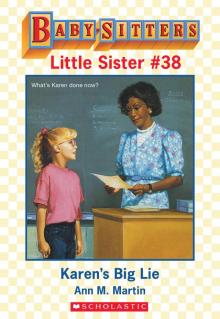 Karen's Big Lie
Karen's Big Lie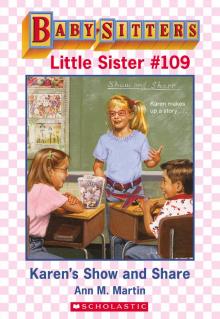 Karen's Show and Share
Karen's Show and Share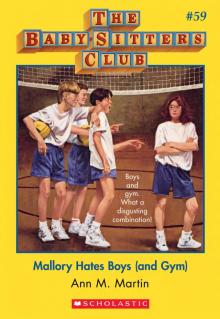 Mallory Hates Boys (and Gym)
Mallory Hates Boys (and Gym)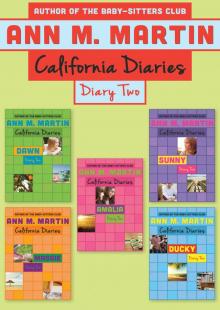 Diary Two: Dawn, Sunny, Maggie, Amalia, and Ducky
Diary Two: Dawn, Sunny, Maggie, Amalia, and Ducky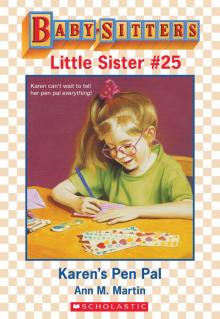 Karen's Pen Pal
Karen's Pen Pal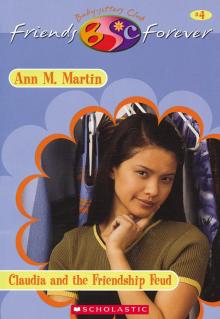 Claudia and the Friendship Feud
Claudia and the Friendship Feud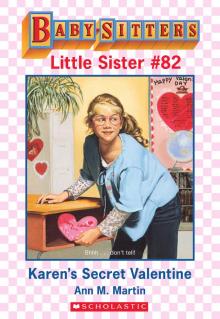 Karen's Secret Valentine
Karen's Secret Valentine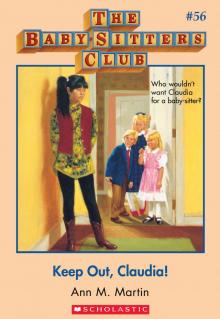 Keep Out, Claudia!
Keep Out, Claudia!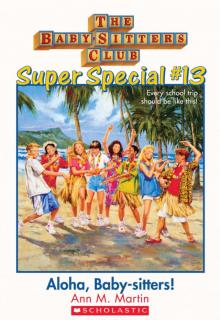 Aloha, Baby-Sitters!
Aloha, Baby-Sitters!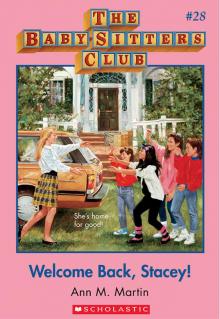 Welcome Back, Stacey
Welcome Back, Stacey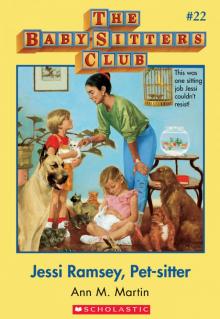 Jessi Ramsey, Pet-Sitter
Jessi Ramsey, Pet-Sitter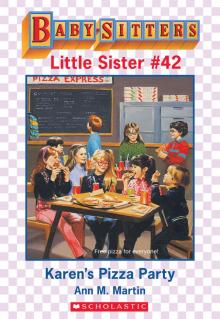 Karen's Pizza Party
Karen's Pizza Party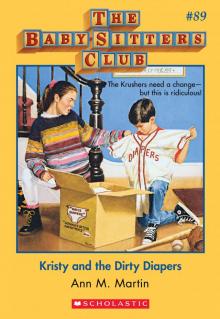 Kristy and the Dirty Diapers
Kristy and the Dirty Diapers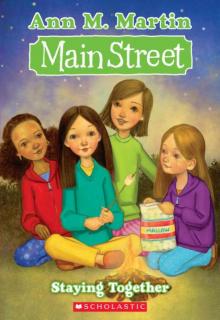 Staying Together
Staying Together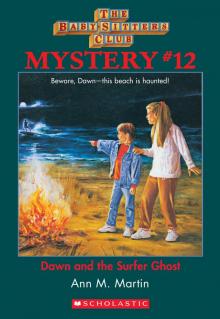 Dawn and the Surfer Ghost
Dawn and the Surfer Ghost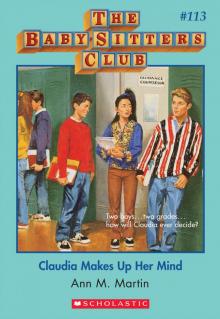 Claudia Makes Up Her Mind
Claudia Makes Up Her Mind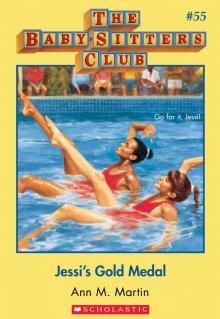 Jessi's Gold Medal
Jessi's Gold Medal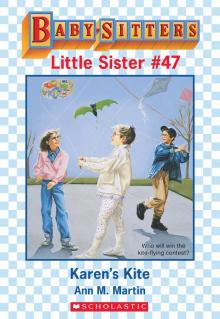 Karen's Kite
Karen's Kite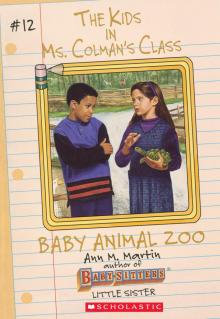 Baby Animal Zoo
Baby Animal Zoo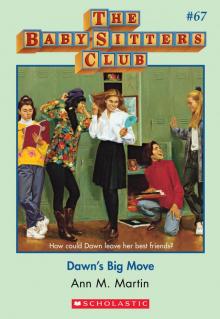 Dawn's Big Move
Dawn's Big Move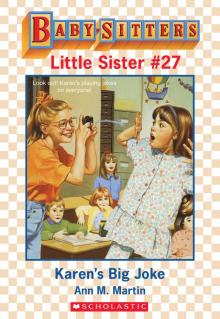 Karen's Big Joke
Karen's Big Joke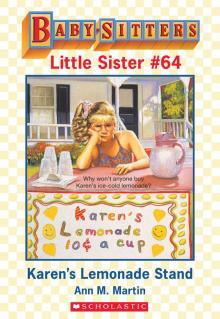 Karen's Lemonade Stand
Karen's Lemonade Stand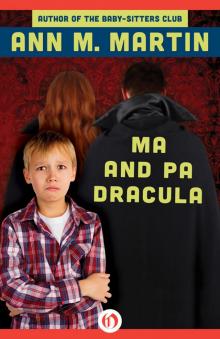 Ma and Pa Dracula
Ma and Pa Dracula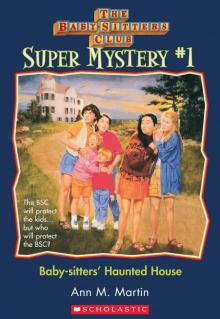 Baby-Sitters' Haunted House
Baby-Sitters' Haunted House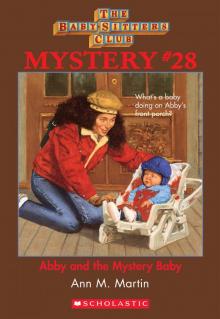 Abby and the Mystery Baby
Abby and the Mystery Baby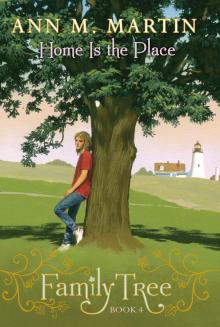 Home Is the Place
Home Is the Place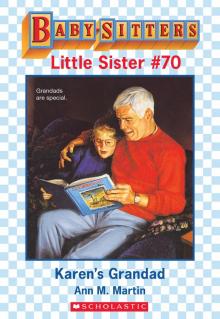 Karen's Grandad
Karen's Grandad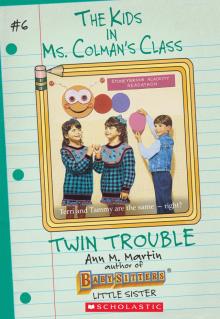 Twin Trouble
Twin Trouble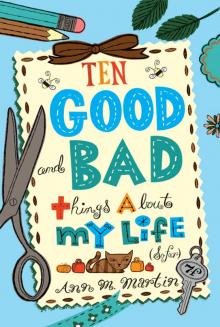 Ten Good and Bad Things About My Life (So Far)
Ten Good and Bad Things About My Life (So Far)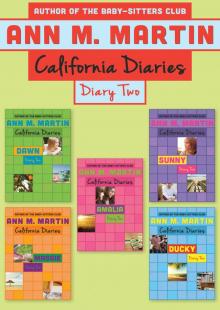 Diary Two
Diary Two Baby-Sitters Club 027
Baby-Sitters Club 027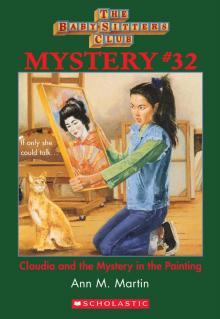 Claudia and the Mystery Painting
Claudia and the Mystery Painting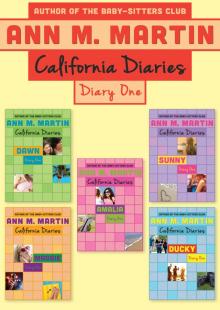 Diary One
Diary One Baby-Sitters Club 037
Baby-Sitters Club 037 Baby-Sitters Club 028
Baby-Sitters Club 028 Baby-Sitters Club 085
Baby-Sitters Club 085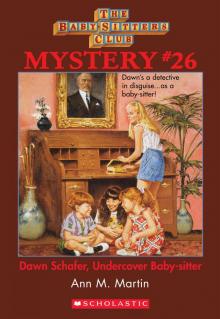 Dawn Schaffer Undercover Baby-Sitter
Dawn Schaffer Undercover Baby-Sitter Jessi's Babysitter
Jessi's Babysitter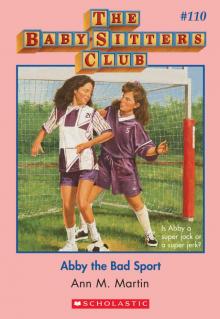 The Baby-Sitters Club #110: Abby the Bad Sport (Baby-Sitters Club, The)
The Baby-Sitters Club #110: Abby the Bad Sport (Baby-Sitters Club, The) Karen's Little Sister
Karen's Little Sister Baby-Sitters Club 058
Baby-Sitters Club 058 Claudia And The Genius On Elm St.
Claudia And The Genius On Elm St.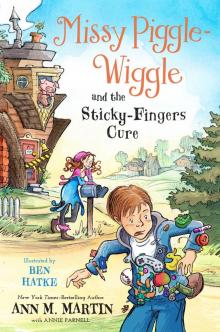 Missy Piggle-Wiggle and the Sticky-Fingers Cure
Missy Piggle-Wiggle and the Sticky-Fingers Cure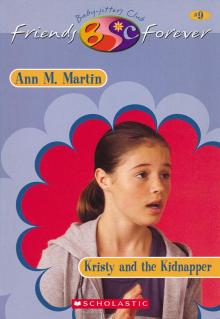 Kristy and Kidnapper
Kristy and Kidnapper Baby-Sitters Club 041
Baby-Sitters Club 041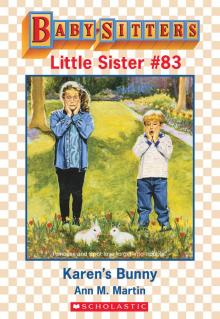 Karen's Bunny Trouble
Karen's Bunny Trouble Baby-Sitters Club 032
Baby-Sitters Club 032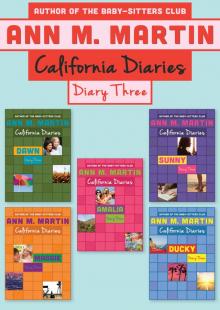 Diary Three
Diary Three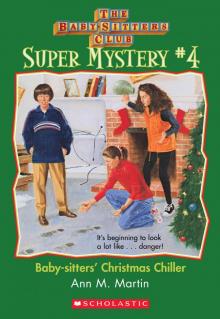 Christmas Chiller
Christmas Chiller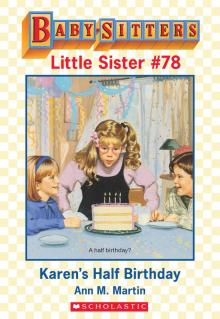 Karen's Half-Birthday
Karen's Half-Birthday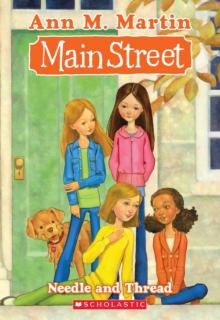 Needle and Thread
Needle and Thread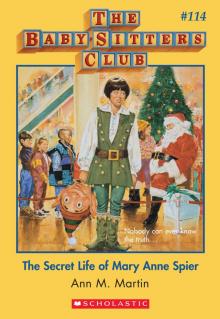 Secret Life of Mary Anne Spier
Secret Life of Mary Anne Spier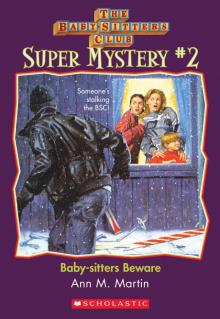 Baby-Sitters Beware
Baby-Sitters Beware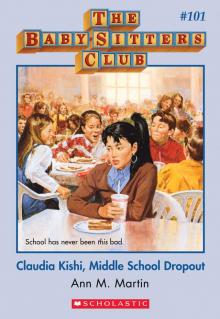 Claudia Kishi, Middle School Drop-Out
Claudia Kishi, Middle School Drop-Out Logan Likes Mary Anne !
Logan Likes Mary Anne ! Baby-Sitters Club 061
Baby-Sitters Club 061 Best Friends
Best Friends Baby-Sitters Club 031
Baby-Sitters Club 031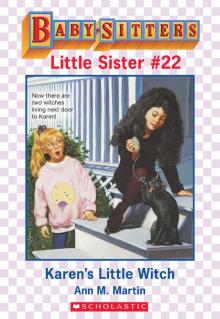 Karen's Little Witch
Karen's Little Witch Jessi Ramsey, Petsitter
Jessi Ramsey, Petsitter Baby-Sitters Club 123
Baby-Sitters Club 123 Baby-Sitters Club 059
Baby-Sitters Club 059 Baby-Sitters Club 033
Baby-Sitters Club 033 Baby-Sitters Club 060
Baby-Sitters Club 060 Baby-Sitters Club 094
Baby-Sitters Club 094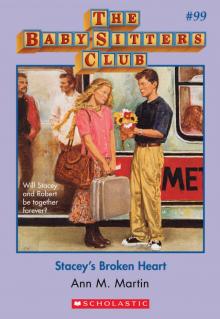 The Baby-Sitters Club #99: Stacey's Broken Heart
The Baby-Sitters Club #99: Stacey's Broken Heart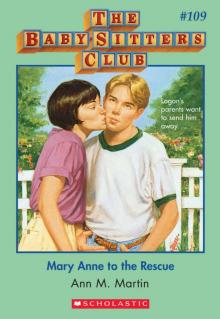 The Baby-Sitters Club #109: Mary Anne to the Rescue (Baby-Sitters Club, The)
The Baby-Sitters Club #109: Mary Anne to the Rescue (Baby-Sitters Club, The) Mystery At Claudia's House
Mystery At Claudia's House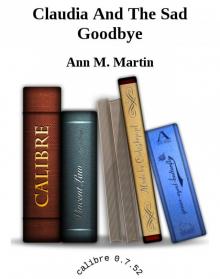 Claudia And The Sad Goodbye
Claudia And The Sad Goodbye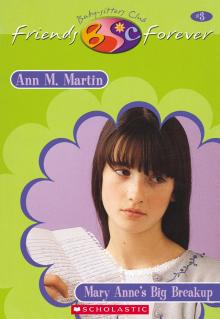 Mary Anne's Big Break-Up
Mary Anne's Big Break-Up Baby-Sitters Club 025
Baby-Sitters Club 025 Baby-Sitters Club 042
Baby-Sitters Club 042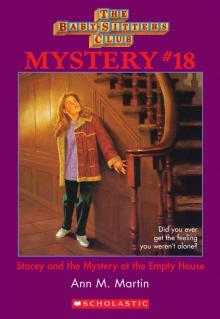 Stacey and the Mystery of the Empty House
Stacey and the Mystery of the Empty House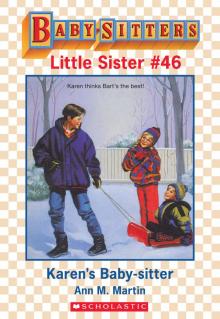 Karen's Baby-Sitter
Karen's Baby-Sitter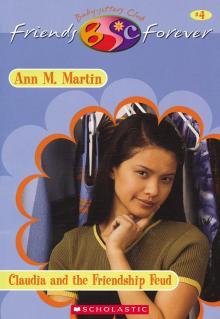 Claudia's Friendship Feud
Claudia's Friendship Feud Baby-Sitters Club 090
Baby-Sitters Club 090 Baby-Sitters Club 021
Baby-Sitters Club 021 Baby-Sitters Club 056
Baby-Sitters Club 056 Baby-Sitters Club 040
Baby-Sitters Club 040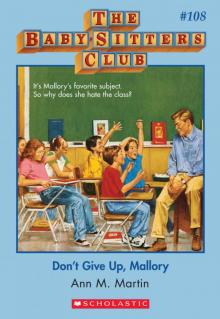 The Baby-Sitters Club #108: Don't Give Up, Mallory (Baby-Sitters Club, The)
The Baby-Sitters Club #108: Don't Give Up, Mallory (Baby-Sitters Club, The)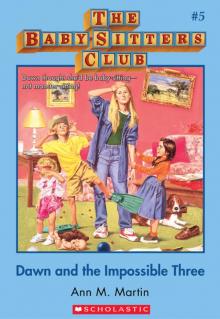 Dawn and the Impossible Three
Dawn and the Impossible Three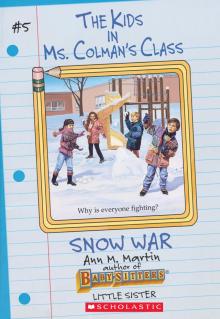 The Snow War
The Snow War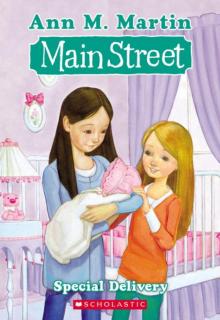 Special Delivery
Special Delivery Baby-Sitters Club 057
Baby-Sitters Club 057 Mary Anne And Too Many Babies
Mary Anne And Too Many Babies Baby-Sitters Club 030
Baby-Sitters Club 030